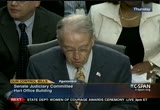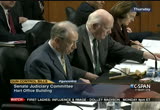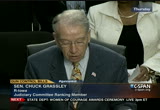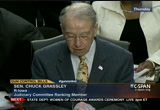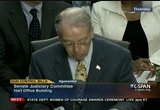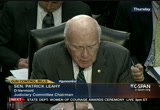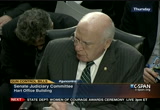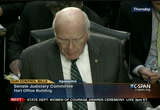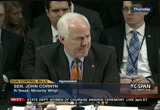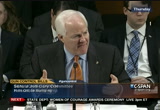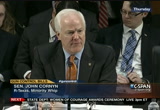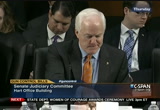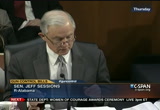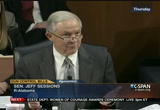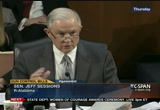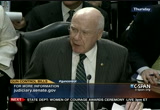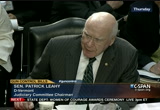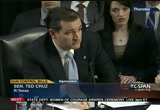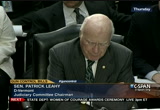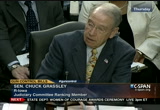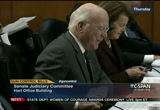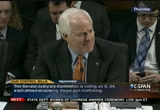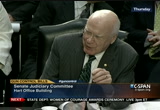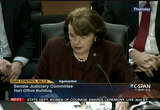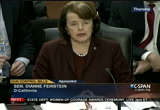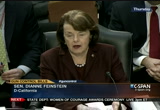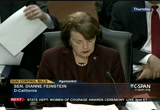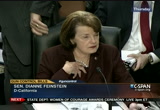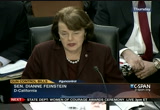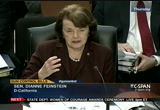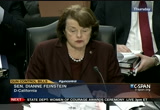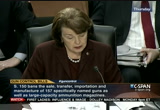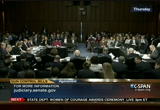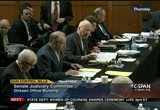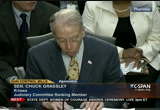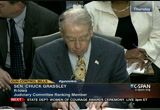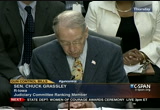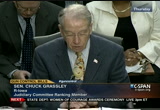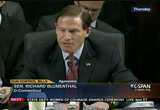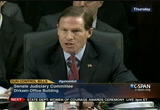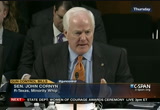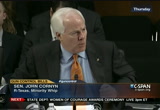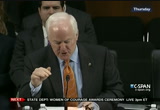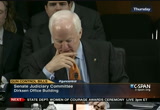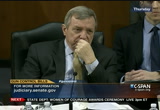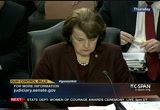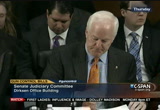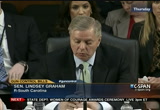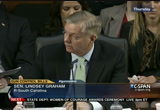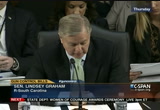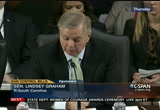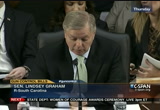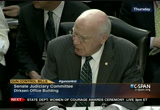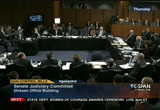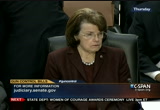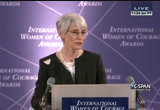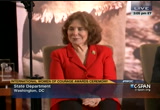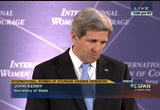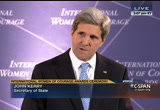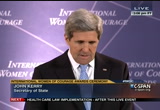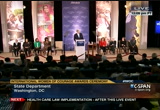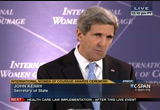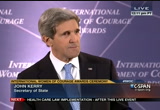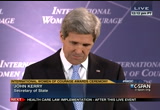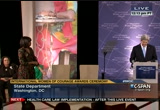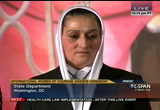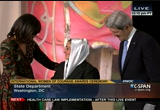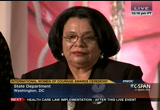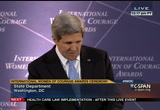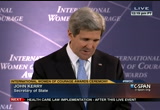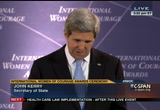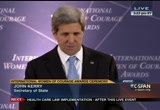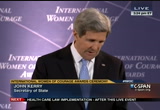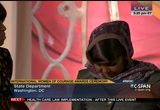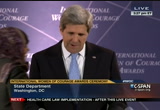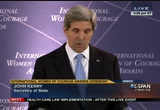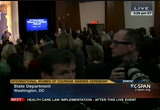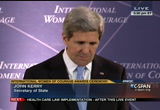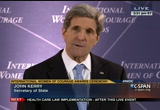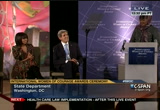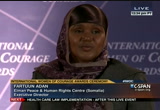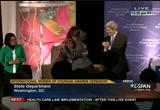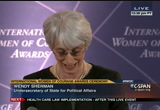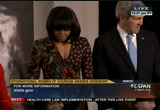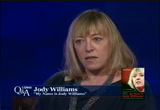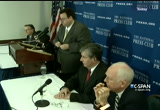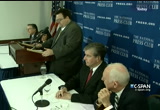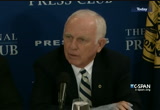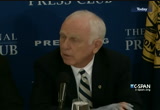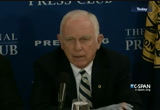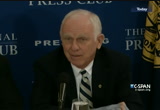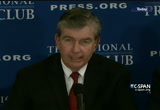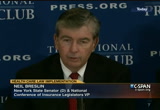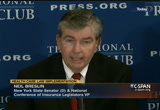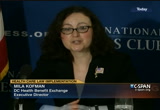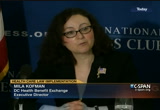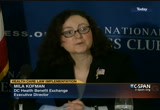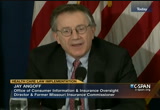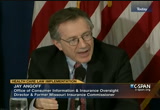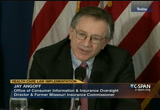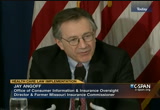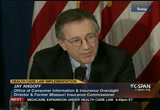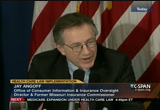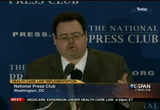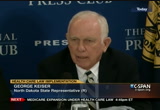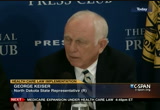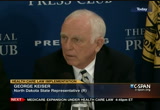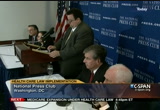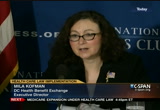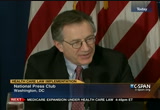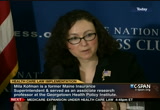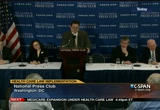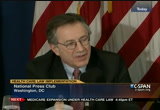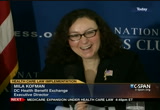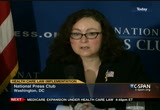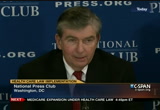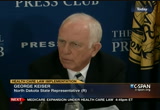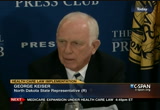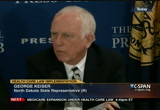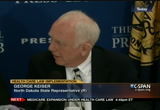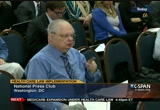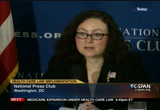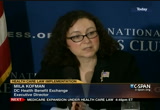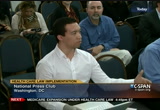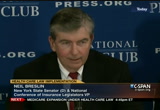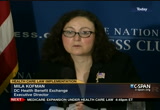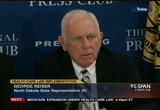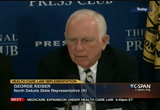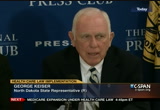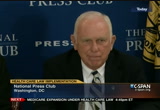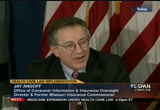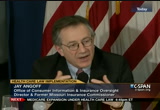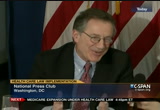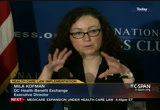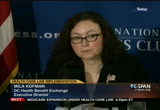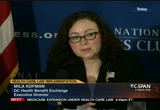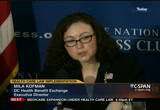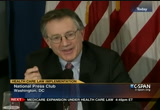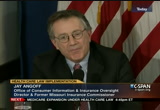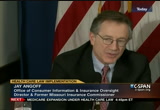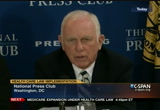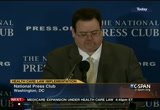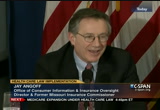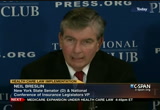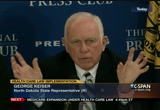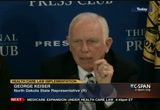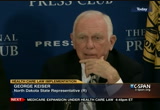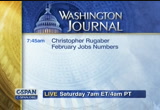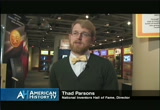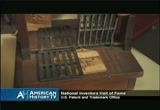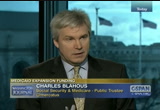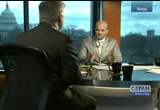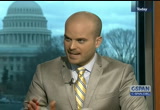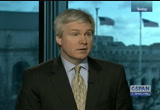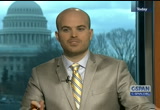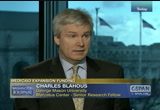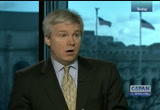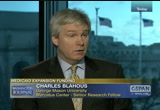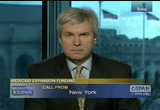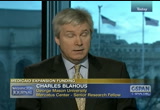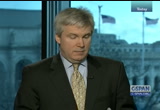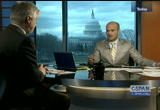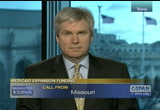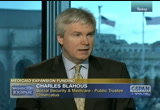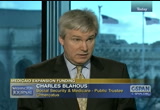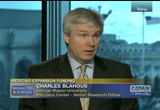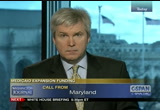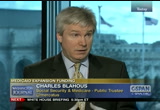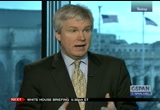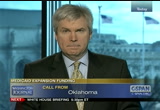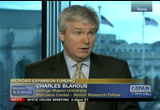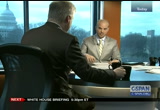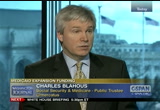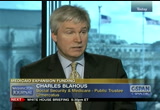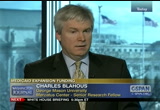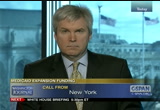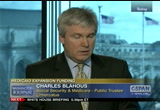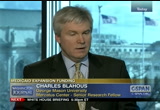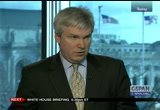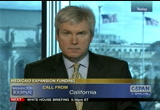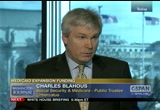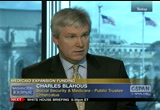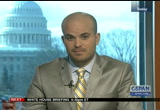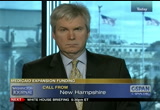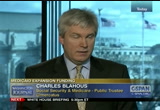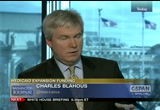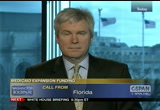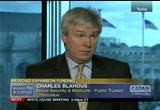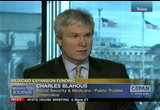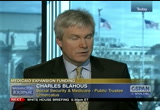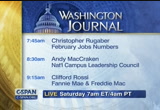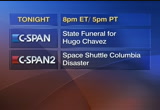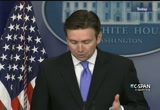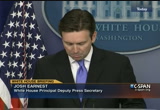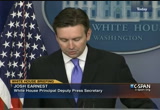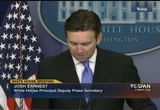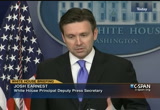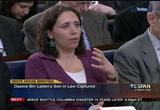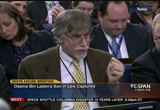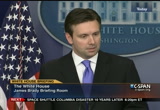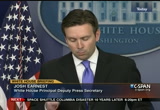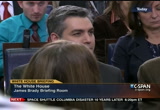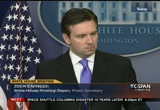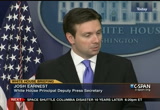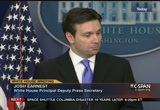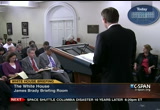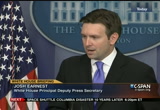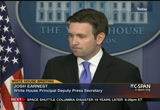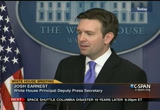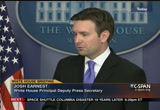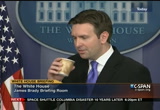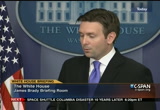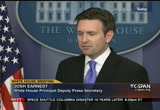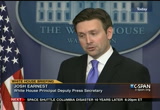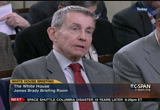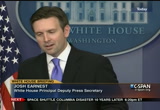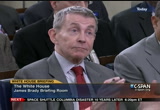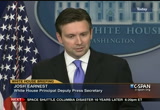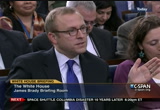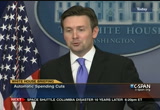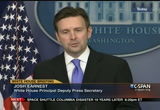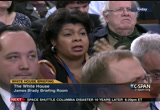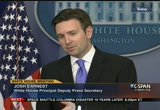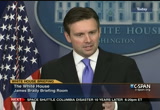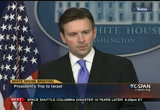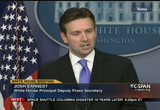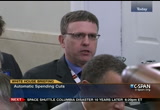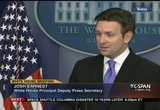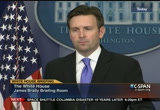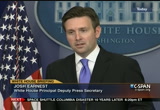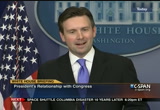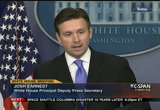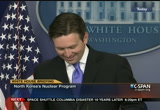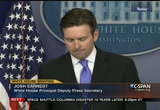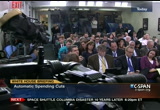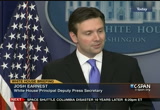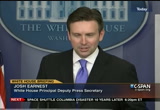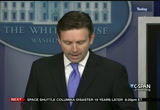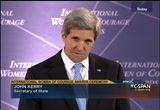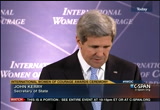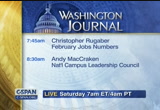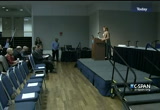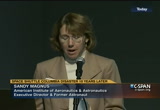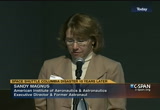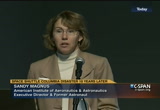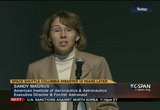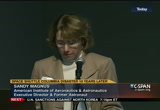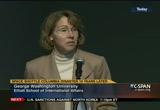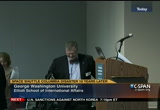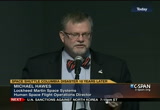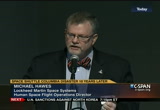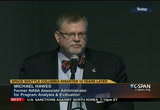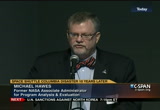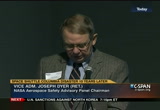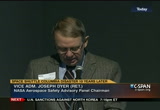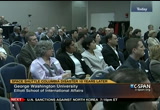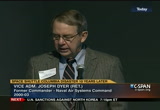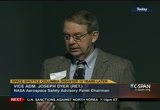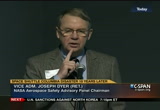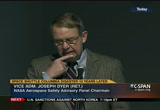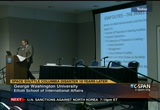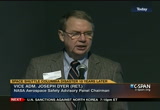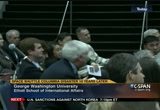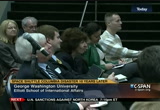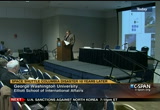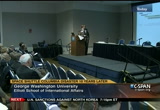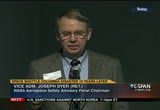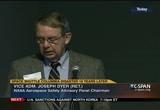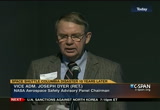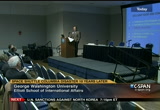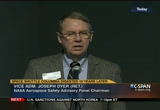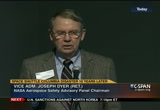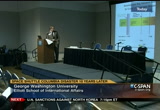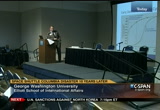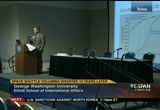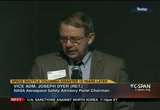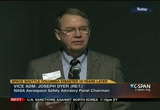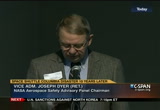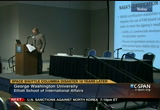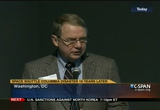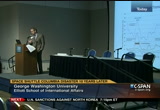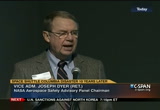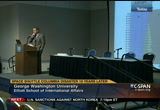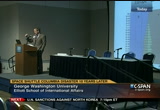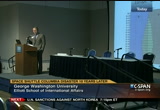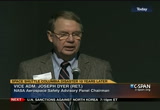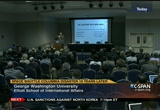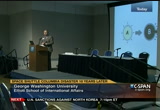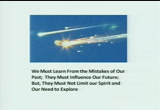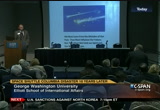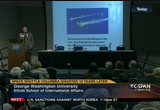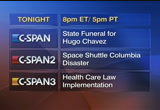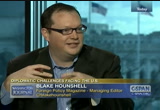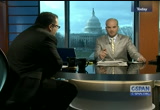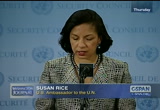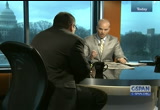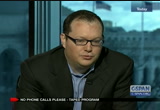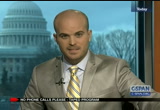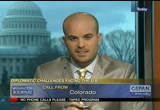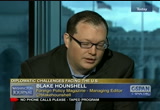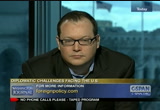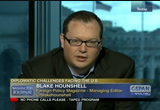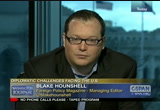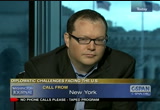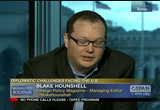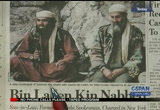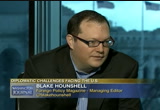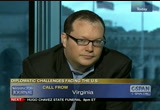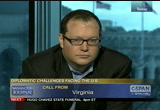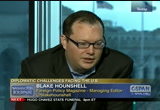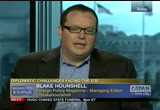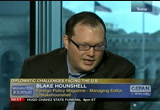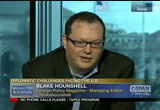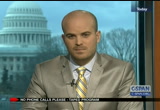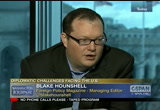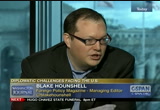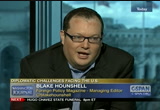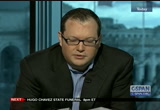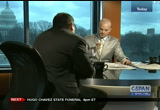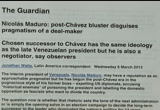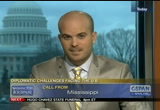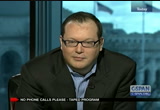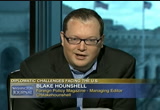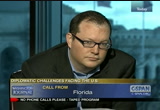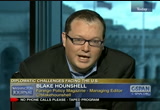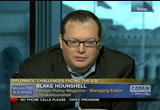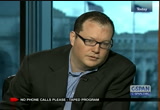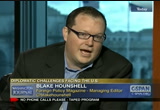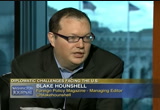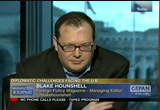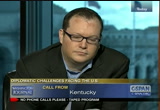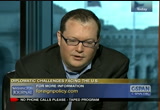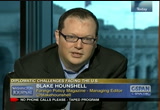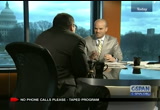tv Politics Public Policy Today CSPAN March 8, 2013 2:00pm-8:00pm EST
2:00 pm
go ahead. >> ok. i greatly appreciate the substitute amendment. i have offered an amendment to the bill which i will discuss separately. federal legislation needed on subjects of straw purchasing and gun trafficking will when i conducted my oversight of the justice department failed operations fast and furious, i was told by whistle blowers that there were gaps in federal laws concerning straw purchasers which should be addressed, and this is our opportunity to do it. mr. chairman, you have worked with me on your bill making many changes at my request. they have made the bill better and reduced the negative side effects of previous versions. i trust you think so as well because you have included the changes in the new bill. the new bill in your substitute amendment also included a revised bill by senators gillibrand and kirk on the subject of gun trafficking. those revisions also reflect
2:01 pm
changes that i asked senator gillibrand to make, and i think it would be worthwhile to outline all the changes that have been made to the bill since they were first introduced. i think they demonstrate good faith of the chairman and senator gillibrand. for instance, senator gillibrand's bill originally would have made it a federal crime to transfer two or more guns if that person knew that the result would be a violation of state or local law. that would have given states and localities a one-way incentive to address new gun control measures and force the cost of prosecution and incarceration on the federal government. it also would have created for the first time a situation in which violation of state criminal law was an element of federal offense. she took that provision out at my request. i raised similar concerns about the language in the chairman's bill and you also removed that
2:02 pm
language. senator gillibrand also accepted major and minor drafting suggestions, including clarifying what intent was necessary to commit a crime, harmonizing penalties, changing the gift exception, altering the directive for the sentencing commission, and others. chairman has also made changes to his bill at my request compared to when senate s. 54 was originally introduced, it is now directed only at straw purchasers not at all transfers on behalf of another. this allows people to buy for people as part of a legitimate business, it preserves private sales. now the bill goes to actual straw purchasers, those who purchase a gun on behalf of a prohibited person. like senator gillibrand, you harmonize penalties at my request and removed references to federalizing violation of state or local law. you made changes regarding sales to persons who do not reside in the state. you took out language concerning materiality of false
2:03 pm
statements on the forms. separated the rules for purchase from licensed dealers from those of private sales. also, limiting the bill to engaging indirectly in the conduct that is already illegal. you have protected the right of law-abiding citizens as i have outlined in ways that i believe were not protected in either the original straw purchasing bill or the original trafficking bill. as a result of the changes to each bill and to their combination in the substitute, the bill now covers only criminals and not law-abiding citizens. since you have shown good faith, i will now demonstrate mine as well. some on my side believe the bill needs more work to resolve outstanding issues between now and when the bill goes to the floor. that is something that i hope will happen with the chairman's help.
2:04 pm
with that understanding and if my amendment is adopted, i will vote to report your bill out today. i thank you for what you have done so far, mr. chairman. >> thank you. i appreciate that. you and i have worked closely on this as we have on a number of things. our bill is tough on criminals. it's crafted so it won't sweep in private seller and buyer of firearms. but it's done in way that we can deter those who abuse the trust of a firearms dealer by engaging in straw purchasing. you noted a lot of your concerns are reflected in my substitute amendment. i understand the intent behind the amendment that you are raising.
2:05 pm
i am concerned the amendment could unduly hamper other law enforcement operations that are properry supervised. including terrorism and drug investigations. we all agree that the government should never permit guns to be transferred to dangerous criminals. this happened in fast and furious. but sometimes to combat straw purchases the government has to o be given latitude to act on a tip and arrest a straw purchaser upon or immediately after a sale, but having said that, i we'll continue to work together prior to the time the bill comes to the floor. if there is no objection i'm prepared to accept your amendment.
2:06 pm
>> i offer the amendment. since you said what you just said, i'm going to put my statement in the record. let me say that i'm willing to consider reasonable changes to my amendment provided the changes don't harm the goals of holding the department of justice accountable for gun operations where veps could walk. -- where weapons could walk. fast and furious was a debacle that will haunt the department of justice for decades. these operations need oversight and accountability. and from that point on oversight and accountability, i think that's an area where i have to draw the line if you'll take that into consideration. >> without objection, the bill is amended by the amendment of the senator from iowa. are there other amendments? >> mr. chairman. >> senator cornyn.
2:07 pm
>> mr. chairman, i believe that stop illegal trafficking firearms act of 2013 which would create several new criminal penalties and amend statutory authorities to target weapons trafficking -- >> excuse me, if the senator would withhold just a second. senator hatch has a statement he wants to include in the record. >> without objection. >> also, clarify the amendment we just accepted was senator grassley was alb-13193. >> yes. >> my concern is that this bill is a solution in search of a problem. straw purchasing for purpose of directing guns to people who cannot legally attain them is already a crime. so we double down and say this
2:08 pm
time we really mean it. when in fact the real problem, i think, in many instances, is the lack of prosecution of existing crimes by the department of justice. as i have said earlier and i'll say again, i have a hard time explaining to my constituents back home how passing more laws that will go unenforced make them any safer. while i understand the desire to act to seem like we are doing something, i worry about the disconnect between the action and any solution to the problems that we all are concerned about. i also worry, mr. chairman, that this legislation which has been shared with my staff, i understand, about the last 36 hours, we haven't had an adequate opportunity to try to vet it and understand what its ramifications might be, and
2:09 pm
my hope would be that there would be some additional time offered that we could try to work with your staff and work on a bipartisan basis to address the concerns we have. for example -- >> you're talking about the amendment that was introduced and circulated on monday? today is thursday. >> my staff advises it was circulated yesterday. >> it was introduced on monday. >> my staff tells me we got it yesterday. the point is, let me just give you an example. for instance, the bill would make it a crime punishable by up to 20 years in prison for a person to attempt or plan to buy a firearm as a gift or raffle item. if the person neglectly fails to know that the recipient is prohibited from purchasing a firearm. in other words, this bill would make it a serious felony for an american legion employee to
2:10 pm
neglectly transfer a raffled firearm to a veteran who unknown to the transferor suffers from ptsd. that example, and i'm sure there are others, causes me concern that we are getting ready to vote on a piece of legislation when we really don't know what the scope or the consequences of the legislation are. which to me counsels taking our time and making sure we understand what the impact will be rather than passing legislation that will have unintended consequences that none of us would endorse, but which in our haste to try to do we are doing something, we end up creating that unintended consequence. >> you're talking about your amendment atm-13249, is that correct? >> i'm talking about s-54 stop illegal trafficking --
2:11 pm
>> i understand. are you introducing an amendment? >> i have not offered an amendment. >> if there are no amendments, then the clerk will call the roll on s-54 as amended. >> i wanted to share something on that. mr. chairman, i do express concern about the penalties in this legislation is difficult to write. i know the chair has worked hard on it. i have some concerns about it.
2:12 pm
in general i support the concept of what you're doing. i think the department of justice has said there are areas in which they are not able to effectively enforce these laws. and they need better legislation. and i'm inclined to think that that's so. although i would note to my colleagues that if you provide a gun to someone that's intending to use it in a drug crime or problemry or a murder, you're an -- or robbery or murder, you're an aider and abettor which makes you chargeable with a murder, or part of a conspiracy to do that and you're chargeable in that way. and that's the way it's normally prosecuted today. so if you go into a gun dealer and certify and the 4473 form, i have prosecuted these cases, if you lie on that form, you are subject to a false statement and the penalties are in the code set forth. i suppose if the person leaves the country like in the situation we had at the border where these guns go into another country, it's
2:13 pm
difficult. all you got left is a violation of the paperwork regulation. that may not be sufficient to properly punish a person. or it may leave you -- fundamentally i think you have some valuable legislation here. but i am a bit troubled by the size of the penalty. i know the chair wants to be tough on this, but at the same time we want to be consistent with other penalties. carrying a firearm during a drug offense is five years. if you brandish it and threaten somebody, it's 10 years. mandatory minimum. so you've got 15 years in this offense for providing a gun to somebody who may use it
2:14 pm
illegally, which would be -- i'm not sure that that's coherent with our -- >> are you saying i'm being too tough? >> maybe. really. of course some of this will be decided by the sentencing guidelines. >> most of the people i prosecuted back in vermont thought i was too tough, too. >> i have always been aggressive in prosecuting these cases. i would say to you i would just share my concern about that issue. think we could fix it and probably solve some problems. >> ok. the clerk will -- >> mr. chairman, could i just ask one last question? >> of course. >> is it the intent of the authors of the bill to make it a crime punishable for up to 20 years for a person to attempt or plan to buy a firearm as a gift or raffle item the person neglectly fails to know the recipient is prohibited from purchasing a firearm? for example? >> no, we -- >> an american legion employee -- >> we drafted it -- >> unknown to the transferor suffers from ptsd is that the intent of the authors of the legislation? >> no. >> that is the result of this
2:15 pm
legislation which i suggest is not -- we need to take our time to make sure we understand what we are doing here. and the problem is senator grassley's amendment was offered just a few moments ago, which you accepted, and i appreciate the fact that you all are able to work together so well, and this committee should be working together, but to jam through legislation that we don't know what the consequences are which would criminalize this american legion employee i think is not our intention. but that is the result of the legislation of everyone who votes in favor of this bill as currently written. that can't be our purpose. >> and that is not the way the legislation is written. you and i have a different view of that, but it's not the way the legislation is written. it is not the way the legislation is intended. we'll have plenty of time before this matter comes on the floor. if you convince me that you're right and i'm wrong on this, i'll be happy to consider an amendment, even further
2:16 pm
clarification, but we have been very careful to be sure we don't sweep in innocent transfers between private buyer of the nature you are talking about. the other senator from texas. >> mr. chairman, i wanted to thank the chairman for his good and hard work on this bill, and i think this bill has the potential for providing some real bipartisan agreement. i think from the beginning members of this committee on both sides of the aisle have agreed that efforts to focus on violent criminals should be the primary area of focus for preventing violent gun crime. i think this bill takes steps in that direction. i agree with the senior senator from texas that i have concerns that certain language, particularly the language in 932 could potentially sweep too broadly and could potentially
2:17 pm
sweep in innocent purchasers rather than those knowingly participating in violent crime and knowingly aiding those who would participate in violent crime from acquiring firearms. i do think there is potential. before this bill is voted on in the floor of the senate to reach some bipartisan agreement that could end up having wide agreement. so i thank the chairman for that and i think -- language can be narrowed so we can be sure not to sweep in innocent conduct. i think we could find wide agreement in the underlying framework here. >> i come from the state where the kind of innocent purchase back and forth you talked about often happened. as you know i'm a gun owner. i spend a lot of time with my fellow gun owners, and one of -- i don't know if i'm' the
2:18 pm
only person in this committee, but i'm probably one of the few who have a pistol range in my back beyond a reasonable doubt which backyard which i use except when we have two feet of snow. so i'll be happy to sit down with you. i'm wondering -- we have a lot ahead of us. if we have the clerk call the roll. >> let me say one thing. >> 15 seconds. >> what the senator -- two senators from texas have brought up are concerns that i have had, and that's what i have been trying to work for. obviously i haven't satisfied these two senators, but i just want you to know those were the things that we have been trying to solve here and hopefully we have solved them. but i'll have to try to convince you of that. but i'll still work to help you get changes made if you think they ought to be made. >> mr. chairman -- >> senator sessions, you wish to be heard again?
2:19 pm
>> i believe the language you used is reasonable cause to believe that they might be unable to receive a firearm, which is pretty close to what senator cornyn says is negligence. so you've got some cause to believe your brother-in-law may have had -- been convicted of a felony or may have -- dealing -- selling drugs. you brought him a gun and if he used the gun during a drug offense, he gets five years. but if you sell the gun to him you can get 15. >> my brother-in-law is a well respected catholic priest and professor. >> that's too broad a language and i hope to be able to support the legislation. we can talk about it. thank you for allowing us to continue this negotiation. for today i would record a no vote. >> i have tried to follow
2:20 pm
existing law, the clerk will call the roll. >> mrs. feinstein. >> aye. >> mr. schumer. >> aye. >> mr. durbin. >> aye. >> mr. whitehouse. >> aye. >> miss klobuchar. >> aye. >> mr. franken. >> aye. >> mr. graham. >> no by proxy. >> mr. cornyn. >> no. >> mr. lee. >> no by proxy. >> mr. chairman. >> aye. >> mr. chairman votes are 11 yeas, seven nays. >> the senator from texas. >> so you don't think i'm trying to pull your leg, there was a complete substitute -- >> you're not the one that talked about my brother-in-law. >> there was a complete substitute at your office at 4:16 yesterday. is when we got the
2:21 pm
language. >> i was on the floor introducing it on monday. >> i'm not saying you personally delivered it to our office. i'm saying your shop emailed it to our office at 4:16 yesterday. that's my only point. thank you. >> all right. and trust me my brother-in-law's a good guy. >> i had the honor of meeting your brother-in-law. >> i know you have. and he's done the prayer at the opening of the session several times. i must say just for -- it has nothing to do with this thing, but one of the things that he's found the biggest thrill when he has been the visiting clergyman for the senate is being able to spend the day on the floor.
2:22 pm
and so many senators, republicans and democrats alike, have come up to talk to him. i did point out that he's much nicer than his brother-in-law, more like his sister. i yield to senator feinstein who has s-150. senator feinstein. >> thank you very much. mr. chairman. i want to -- thank you very much, mr. chairman. i want to thank you for allowing me to hold the hearing. i want to just report to you that we heard from one bereft and grieving father who lost a precious son at sandy hook. we heard from the trauma surgeon there who took care of their bodies and talked about what these weapons with the bullets do when they explode inside the body. we heard from the head of the united states conference of
2:23 pm
mayors, mayor nutter of baltimore -- excuse me of philadelphia who assured us of their support. we heard from chief flynn of baltimore who assured us of the support of the chiefs and talked about his city. i want to acknowledge the presence of chief johnson of the baltimore county police department's here. and we had a demonstration of a slide fire stock placed in an ar-15, which was able to alternate the gun between semiautomatic and fully automatic fire, excuse me, chief flynn is from milwaukee. i have been very concerned because the calls have been coming in as if this is some kind of wild-eyed scheme. it is not. every single poll that has been done in the united states has
2:24 pm
shown that a majority of people favor this legislation. we have endorsements from virtually every religious organization, every medical organization, mayors, police, women's movement supporting this legislation. and yet it's as if we have a minority unsubstantial piece of legislation. whether it's a johns hopkins poll, 69%, mayors against illegal guns at 81%. it's been a very hard road. there's been argument by the opposition this measure is unconstitutional. i deeply believe that it is not unconstitutional. it is basically formed from the prior legislation. legislation which survived testings -- tests in the fourth, in the sixth, in the
2:25 pm
ninth circuit and the d.c. circuit. no assault weapons legislation statewide in this country ever has been found unconstitutional. and the heller decision clearly stated, and i quote, the rights secured by the second amendment is not unlimited, end quote. and, quote, dangerous and unusual weapons, quote, could be prohibited. since heller state assault weapons, as i said, have been upheld and no court that i am aware of has ever found an assault weapons ban to be unconstitutional. over 50 distinguished constitutional law professors, including conservatives and libertarians from our nation's leading law schools, including harvard, stanford, yale, and chicago signed a statement confirming that an assault weapons ban is constitutional. i particularly want to thank the co-sponsors on this committee. i want to acknowledge the
2:26 pm
long-standing support of the man who presented the ban in the house of representatives over 10 years ago. the distinguished senator from new york. i want to point out that senator durbin's support in the committee was really strong and appreciated. and i want to thank virtually all of the other co-sponsors in this room. i want to just point out that i carefully watched senator blumenthal. i saw his care. i saw his -- and senator murphy, too, his representation of that deeply affected community in connecticut and i just want you to know i have deepest respect goes to you for what has been a very hard venture. i'm particularly grateful for your support of this legislation. now, what does this legislation do?
2:27 pm
it bans specific assault weapons by name. 157 in this instance. it protects the rights of gun owners to possess weapons for legitimate hunting and sporting and defense uses. by excluding many more weapons by make and model, over 2,000 of them. it grandfathers all present weapons. if they are transferred, it subjects the transferee to a background test. it does not require registration. it applies to military characteristics test to judge future weapons to prevent gun manufacturers from evading the ban by simply changing the name of the weapon. or a physical characteristic of the weapon. we tried to learn from the last bill and refine this bill to avoid the problems of gun manufacturers simply getting around the bill.
2:28 pm
the features that we use were originally developed for military weapons for one reason, to make the weapon more effective and efficient at killing people in combat situations. as chief flynn of the milwaukee police department testified last week, and i quote, assault weapons are built to inflict violence against humans. their military characteristics are not simply cause matic in nature. these weapons are designed for combat. i have watched even police departments get outgunned. in the nine years i was mayor of san francisco we started out with police issue being a .38 caliber revolver. we have seen that escalate. we have seen shotguns be removed from squad cars and replaced with assault weapons. why? because of an increasingly armed criminal element that
2:29 pm
police often have to go up against. i watched as the los angeles police department had to break in to a gun store to take weapons to be able to counter what was going up against them following a robbery in los angeles. i don't know why anyone would object to drying up the supply of these weapons over time. they are not good hunting weapons. many states have limits on the number of bullets that can be on a clip. and who's going to respect a hunter with a 30-round clip and an assault weapon going after a deer? i certainly am not one that would. so the intention of this is to dry up the supply over time. while homicides in general are down in this country, mass killings are not.
2:30 pm
and the fact is that these assault weapons have a great attraction for grievance killers, the people that go into law offices as they did in san francisco and shoot down 14 people, the man who went into the aurora theater just to kill people with 100-round drum in an assault weapon. and we have seen it in universities, we have seen them in elementary schools, and now we have seen them used against first graders. the time has come, america, to step up and ban these weapons. yeah, they are very important part of this bill is -- the other very important part of this bill is to ban large capacity ammunition feeding devices. those that hold over 10 rounds. we have federal regulations and state laws that prohibit hunting ducks with more than three rounds, yet its legal to hunt humans with 15 round, 30 round, even 150-round magazines.
2:31 pm
limiting magazine capacity is critical because it is when a criminal, a drug dealer, a deranged individual has to pause to change magazines and reload that the police or brave bystanders have the opportunity to take that individual down. we saw the scenario happen in tucson, arizona, where the madman who shot our former colleague, gabby giffords, was taken down when he had to change magazines. so my view is that how could i stand by and see this carnage go on? and members, this isn't going to stop.
2:32 pm
it's going to continue on. and we have a chance to do something about it. i cannot tell you how much i was -- i was mayor of san francisco for nine years. i walked into places i saw the carnage firsthand. and at that time i really dedicated the rest of my life to do something about it. so this is an opportunity. i want to thank those who are with me. i don't know that i could convince those that are not, but i intend to keep trying. thank you, mr. chairman. >> do you have any amendment to your amendment? >> i do not. >> are there amendments to senator feinstein's? first senator grassley. >> i appreciate senator feinstein's sincerity. i expressed that three or four times at the last hearing i suppose as much as i oppose her bill. she wonders whether i appreciate her sincerity or
2:33 pm
not. this has been an important issue for her for 20 years. and we all have to feel for the victims of newtown, but there are other parents of children who were killed at sandy hook elementary school who mourn the loss of their loved ones no less, and yet feel very differently about the ways congress should respond. on tuesday i spoke to mr. mark mateoly, his son james was one of those victims. even in his grief he sent me a letter that he authorized me to seek consent to place in the record and quote during the debate. he describes how no one should have to endure what he has endured, and of course no one should. he wrote, quote, i can understand where a knee-jerk reaction comes from to ensure never again.
2:34 pm
i caution that we employ common sense and do not hand over any liberty which is protected by the constitution, end of quote. i agree. we continue to wait for the justice department constitutional analysis of the bill despite statements by the department of justice witness at two hearings on this matter. i have yet to see an opinion from the department arguing that this bill is constitutional. i appreciate the input of other scholars who have offered their opinions as witnesses, but the justice department has or should have a different role in providing us with a constitutional aalies. i go back to -- analysis. i go back to the father saying that the debate should not be about controlling guns, but controlling people who cannot control themselves like people
2:35 pm
with mental illness and felonies. he favors making sure that people can find the moral compass and parents teach their children right from wrong and do not expose them to violence. i agree with him on this point. then he writes, quote, for those who tell me that my son and 25 others were killed that day with an assault weapon, i challenge them to consider, end of his quote, other important factors. he says that assault weapons, quote, are not a threat to our safety, end of quote, and he's very focus ready on improving mental health services. he also opposes the limit on magazine compass its. he asks, quote, with 250 million guns in the united states, how are you going to make me safer by reducing new
2:36 pm
magazines to one, five or 10 rounds? question mark. he continues to say, you will not increase my safety, on obstruct me from protecting myself from criminals who have them, end of quote. he survived this terrible ordeal and to make the terrible -- and to make the statements he made. his words, difficult to write, i'm sure, are an important viewpoint that we should consider. this is especially true when the constitutional concerns about this legislation that arrive in light of the heller decision. i continue to believe that this legislation is flawed under the second supreme court second amendment cases. given those flaws, i oppose the legislation. thank you. i yield the floor. >> thank you very much. i'll try to go back and forth here.
2:37 pm
anybody seeking -- >> mr. chairman. >> senator blumenthal. >> i want to begin by thanking the chairman for his leadership on the illegal traffic -- >> is your microphone on? >> i want to begin by thanking the chairman for his leadership on the illegal trafficking bill and commend him and my fellow co-sponsors and thank senator feinstein for her very kind comments but most especially for her leadership on this bill. the plain, simple, blunt fact is that some, if not all of the beautiful children who perished that day in newtown, along with great educators who gave their lives trying to save those children, might well be alive today if this ban had been in effect, a ban on these military-style assault weapons
2:38 pm
and the high-capacity magazines. as senator feinstein has already told the committee, we heard testimony from captain mark kelly who recounted what happened in tucson that day when the shooter had to change magazine, and christina taylor, the 9-year-old who perished that day from the 13th bullet fired probably would be alive if the magazine used by the shooter had been limited to 10 rounds. the same is true in newtown where children were able to escape because the shooter had to change magazines on that day. more than 10 children are alive today because of his need to change magazines. and more would be if his magazine had been limited to 10 rounds, as our legislation would do.
2:39 pm
so i recognize that there are concerns about it. we've heard them. the overwhelming majority of the american people are in favor of this legislation, and the opponents fail to reflect the concern that goes beyond newtown but certainly newtown is a call to action. it has created a sense of urgency that americans feel and i hope the committee will reflect that sense of urgency in approving this legislation. >> thank you mr. chairman. i'd like to start by saying i agree with senator grassly that sometimes congress tries to impose from washington, d.c. a one size fits all proposed solution that really is best left to localities and states. it's become clear to me, if it
2:40 pm
wasn't clear before, that there are cultural differences in america between those people who have grown one guns and know how to use them. they are comfortable with them, they use them safely for hunting or recreation or self-defense. and then there are other people who are scared by guns because they've never been around one. perhaps they live in an urban area where the only gun they see or hear of is one in the hands of someone committing a crime. so i think first of all i would just say in an aeffort to legitimate for the entire united states in a one size fits all proposal is a mistake. and i would say that this is not a ban on weapons. the senator from california who i have great admiration and respect and affection for acknowledged that this legislation does nothing to
2:41 pm
deal with the fact that many of these weapons which will now be outlawed are already in the hands of law abiding american citizens. so it is not a ban. it sls not -- what it does impact are semiautomatic rifles. now you can call it an assault weapon because it looks like for cosmetic purposes it looks scary to people who are not familiar with them. but the fact of the matter, these are semiautomatic rifles and this bill does nothing to deal with semiautomatic handguns. i'm not saying it should. i'm just pointing out it is not going to achieve the goals that the sponsors believe it will. and i believe one of the biggest problems we have in the
2:42 pm
country is the lack of enforcement by the department of justice of current laws. we all support keeping straw purchasers from buying weapons and directing them to people who can't legally own them or posses them. we all believe that mental health ought to be a focus of our efforts here and this bill does nothing to deal with that. and we all wonder why it is the department of justice won't prosecute people who lie on background checks. well, i think they told us because they don't deem them a sufficient priority to do so. but i guess we ought to ask the question why what could we do to address the non-enforcement of current laws versus passing new laws. president clinton tried an assault weapons ban 19 years ago. and we have the benefit of
2:43 pm
hindsight as well as some research to examine the lackluster results of that decade long experiment. according to the department of justice's own study, it was completely inferktle in reducing murder or crime rates. some have talked about this study funded by the justice department and claimed it reduced gun murders by 6.7%. but the problem is the study reveals how weak the evidence really was. the author said however the evidence is not strong enough for us to conclude there was any meaningful effect, i.e. that the effect was different from zero. so are we really going to pass another law that will have zero effect and pat ourselves on the back and say we've accomplished something wonderful?
2:44 pm
we tried this experiment once and it failed. and i think it promotes symbolism over seriousness to repeat that mistake. a real concern of mine is that the efforts to enact this gun ban are distracting congress from working on areas that i believe there is a broad consensus in keeping deranged mad men from buying guns. if there was a common thread in the masacres it was the mental illness of the sheert this. bill does nothing to deal with that. the commonality is not the type of guns used, some used piss tols, some used rifles and at least two shot guns were found at the scene of these crimes. the common thread was mental illness. no one wants disturbed young men or women for that matter to
2:45 pm
have access to firearms. unfortunately this legislation focuses not on mental illness and guns but on cosmetic features of certain firearms. we should refocus our efforts to make sure the background system works to screen out the dangerously mental ill. i'm encouraged that some including senator gram have proposed patching the holes in the background check system that allow the mentally ill to buy guns. that would bring a consensus and be a real solution to a real problem. but sadly, we seem to be focused on window dressing and risk putting symbolism over substance. >> is there a further discussion? >> senator gram. >> thank you.
2:46 pm
a poll jies for being late. we're having a hearing and it's been very informative in the armed services. to my colleagues there seems to be bipartisanship emerging on certain parts of the problem. we have come together to try to fix a problem i think everyone would agree there needs to be fixed. there was a young laid who is clearly mentally untable tragic figure in many ways in 2005 in south carolinas she was arrested and dieted for threatening the life of the president of the united states and members of congress. very disturbed young lady. she pled guilty -- not guilty by reason of snanty. the federal court ordered her into treatment. she went through a pretty laborous process and found toict render trial and entered
2:47 pm
a plea of not guilty by reason of snanty. the court ordered treatment in a confined environment. she was eventually released. she went to south carolina in february of this year and was able to buy a gun. she passed the background check. the system did not record the fact that she had been adjudicated mentally incompetenter and a danger to herself and others. she bought pistol and went to ashley hall private school, went into the administrators office and pulled the gun out and it did not fire. thank god she's been arrested and she needs a lot of help. but there is an effort to make sure that adjudications like that get into the background system. there are over 14,000 adjudications in south carolina of people who are a danger to themselves and others through a
2:48 pm
court process that are not entered into the federal system and my state is trying to fix that problem. i hope they are successful this south carolina of entering these cases into the federal background check system. there are some things that many are doing that may bear fruit. so keep trying. but as to the assault ban, i know that senator fine sign the has been consistent and is sincere and what more could you ask. that is a compment to her. my belief is the solution being proposed has constitutional problems and doesn't solve the problem. 2.5% of the murders committed in 2011 involved rifles. there were more people killed with bare hands than that. the assault weapon whits misused is a tragedy when any gun is misused. i think a lot of us agree that
2:49 pm
mentally unstable people shouldn't have any gun with any bullet and the law abiding citizen may need more than ten bullets given what they may face in the real world as it is. my objection is this doesn't fix the problem. it didn't work before and it won't work now. since then there has been a supreme court test that is the heller case. the second amendment right to posses a firearm for purposes such as self-defense. to my colleagues, vice president biden a dear friend of all of us has belief that the double barrel shotgun is the best way to defend one's self-. if you have a problem go out in the backyard and fire two blasts. that's not an unreasonable thing but once you shoot twice you don't have any more bullets
2:50 pm
so you better take some shells with you. in an environment where the law and order has broken down, earthquake, terrorist attack, cyber attack where the power goes down and dam is broken and chemicals have been released into the air and law enforcement isn't able to respond and people take advantage of that lawless environment, i have an ar-15. i'm not going to do anything illegal wit. i think it's better than a double barrel shotgun. the home with an ar-15 is better protected from a gang without a gun or a double barrel shotgun. you can disagree. i think what i'm saying makes sense and is not irrational. >> there are more than 15
2:51 pm
million dangerous and ununusual. an ar-15 misused is dangerous like any other good. but i would not say it's an unusual weapon since so many people have fwauth weapon. i will vote against the legislation. it didn't work before and i don't think it will work now. i think it miss the mark of what the real problem is. i doubt the constitutionality and i'm disappointed they couldn't render an opinion on this. thank you for allowing me to speak. >> thank you. senator grassly is returning in about a minute and we are going to -- he has an amendment and following normal procedure, we will yield at the to senator
2:52 pm
grassly as ranking member to bring up his amendment. but you wish to say something first. >> while we're waiting if i might add a few comments. i'm grateful mr. chairman for your leadership and to the members of this committee for their conversation. i was encouraged by comments i heard earlier in the discussion about the stop illegal trafficking and firearms that led me to believe there is bipartisanship here. the issue of stopping trafficking and it's my hope that as these bills are not just taken up by this committee but as they move to the floor we will not stop listening to each other to try and find ways to focus and improve them. i've gotten input from my home state of delaware on these bills. it's been passionate and diverse. there are clearly differences of culture and region of those
2:53 pm
who have grown up with and are comfort wble firearms whether for self-defense and sporting activities and those who are not. i've gotten strong input from life long friends, from leaders in law enforcement from family. there are a lot of misconceptions about what these bills do. a number of leaders in my community expressed strong opposition to this bill. i've heard directly from our vice president, from our governor and from senator fine stine who i respect to doing everything we can to reduce the vablet of went thans can be used to kill and to harm. i think we've got a number of important legislation that will fight gun trafficking and this
2:54 pm
is one more that needs to be a broad and searching effort to find the right balance and find the right slufplgtse so although i think none of these bills is perfect, all of them deserve further consideration. we cannot let the perfect be the fwood. neighbors who have lost family members in violence, i intend to vote in favor of this bill. >> live to the state department for international women's day. michelle obama taking part in the international women of courage ceremony. this is live on c-span. >> of the secretary of state's international women of courage awards. to mark the 102 anniversary of international women's day, we celebrate women of courage from afghanistan, china, honduras,
2:55 pm
india, nigeria, russian, so moll i can't and vietnam. all countries i have had the privilege of meeting with extraordinary women. today i have the honor of introducing our extraordinary woman, our first lady, michelle obama. [applause] i know our current social security will permit me to say $secretary of state will permit me to say we are a big fan of first ladies. throughout her life and as
2:56 pm
first lady, michelle obama has always stepped up. when faced with a challenge, she not only faces it, she joins forces with those around her to make america and the world a better place. whether it is ensuring our military men and women and their families are cared for and have jobs to return to, encouraging our young people to let's move or doing the doug gi on late night television, she engages us, she inspires us and she empowers all of us to step up. michelle obama is about doing the right thing. she has stepped up her efforts on the behalf of the american people and served alongside her husband with great distinction. and in a moment of personal privilege i want to thank her
2:57 pm
for being another kind of woman of courage that is true of many of the women here on the stage and here in the hall and throughout the world and that is being a great mom. [applause] every single day women try to get up and raise their families and have a good life for their children and she is a good role model in that regard. i hope you will join me in welcoming the first lady of the united states, michelle obama. [applause] >> thank you. thank you all. let me begin by thanking under
2:58 pm
secretary cherman for that kind and gracious introduction but also for your leadership on behalf of our country. i also want to thank secretary carrie for hosting us here today. we are thrilled to have you as our new secretary of state for no other reason than i love your wife. i love our secretary, but his wife is another woman of courage who has been a dear friend and supporter for me for a very long time and it is just a thrill to have you both in this role. congratulations and thank you. [applause] i also want to recognize secretary southeast bill youse who can also do the dougy, i've seen it and members of congress
2:59 pm
and the did i want community who have joined us today. and i want to thank you as we celebrate international women's day. every year i look forward to it because it shows us what our most basic values look like when they are put to the test. when these women witnessed po risk crimes or the disregard for basic human rights, they spoke up risking everything they had to see that justice was done. when they saw their communities or their countries were ignoring issues like sexual violence or women's rights, they gave those issues a face and a voice. and with every act of strength and defines, with every blog post, with every community meeting, these women have inspired millions to stand with them and find their own voices
3:00 pm
and work together to achieve real and lasting change. that is truly the power of the international women award. this is a call for all of us to open our eyes to the injustices around us and to ask ourselves just what kind of courage we've got inside our own hearts. and that is the lesson we can learn from the journalists who speaks out against torture and racism. .
3:01 pm
let these women be your guide. in them, you can see no matter who you are. we always say this or where you come from, if you are willing to dig deep enough and fight hard enough and believe strongly enough in yourselves, then you can truly change the world. that is why we want you to be here every year. and the potential absolutely -- [applause] and the potential that i see and all the young women across this world that reminds nae the rest of us must work to lift up
3:02 pm
the women and girls in our own communities because we know that when women and girls rise, their communities and their country zrise with them. it is true in honduras, syria, and right here in the united states. we saw that just yesterday when my husband signed the reauthorization of the violence against women act. [applause] so i want to thank everyone who worked so hard to ensure that victims of domestic abuse will always know that they will have somewhere to turn and someone on their side, and in the months ahead, in the years ahead, we must all do our part to build upon efforts like that one and learn from the example of the women that we honor today, because if we tackle the
3:03 pm
injustices and challenges in our lives, with even a fraction of their strength and dedication, then i know that we can meet any challenge that comes our way. if we encourage the young people around us to fight every single day for what they know is right. if we break down any barrier that stands in the way of a young woman getting her education or believing she can achieve her dreams, thin am confident that we'll finally unlock the promise of our next generation, and then no matter what part of the world we call home, we'll all be better off. we will all be stronger and freer. we will all be more prepared, not only to solve the problems we face today, but to overcome any obstacle we can i g gin in the years and the decades ahead. so thank you. thank you all for your tremendous contributions to our world, we are so honored and privileged and grateful. god bless you all.
3:04 pm
[applause] and now its my honor to turn this program over to secretary kerry. [applause] >> michelle, thank you very, very much for extra ordinarily warm, generous words of introduction. i am very proud to be working with the president and with you and all of us here and throughout the country and the world, extra order inly grateful for the remarkable and inspiring job that you are doing as the first lady of our nation. thank you for that. it is amazing. [applause] we all talk about passionate advocates for women and girls both in our country and around
3:05 pm
the world. i think everyone here would agree that at the top of that list, we will find our first lady michelle obama and we're grateful for her leadership. it is an honor for me today to be on this stage with these remarkable, indeed, extraordinary women, and i want to recognize if i may very quickly, another woman of courage, the first lady was kind enough to introduce her but she marched against apartheid as a student in south africa. she worked hard in the decades since to improve the lives of women with respect to the environment and health, and i am delighted to call her my wife. [applause] as you know, i returned less than 48 hours ago from europe and the mild east where i
3:06 pm
visited the countries that represent a very broad spectrum of progress on gender equality, and i met with dozens of leaders, but i also listened to a lot of every day citizens. people who like today's honorees know that you don't have to be elected or appointed in order to make a difference. i spoke with one woman in berlin. she is muslim. she told me she is part of an organization of teenagers who have created a dialogue about equality and tolerance, so my friends, steps from the markings, the old markings and brick of the berlin wall. a young muslim woman today proudly stands up with her peers to map a very different and better, more open future. her activism and her
3:07 pm
fieldlessness spoke to me about a special kind of courage. courage that i saw years ago and when i met her in her home when she was confined in burma or the courage i saw again in four burmese women who were the first people i met right after had been sworn in as secretary of state. i met in this building as third day as secretary. two of them had been political prisoners, and today, all of them are giving back to the very country that had once confined them. it is courage, and it is not just the courage that you see in women in the way that michelle obama just described. courage of people raising kids, certainly women raising them, but also the courage of every man who defendeds his daughter's right to an equal education, or every brother who challenges the law that keeps his sister from owning property, or opening a busines
3:08 pm
business, or every husband, who not only promises that the cycle of domestic violence can stop with him, but who proves it. i see that courage. i see that hope in every woman on this stage, and you will learn that in a moment. in a testimony of the four honorees who cannot be here today because of the repression and the intimidation that still festers around the world. i see how much work we still have to do and so do you. one of the awardees is in hiding, another is in prison. we present a fourth award for a brave woman whose life was brazenly stolen by brutal violence. their cause is our cause. women's issues, as we know, are more than just women's issues. they are family issues. they are economic issues.
3:09 pm
they are security issues. they are justice issues. they matter to all of us men as well as women, boys as well as girls, those who live in free country, as well as those who don't. that is why, including with the work of secretary clinton, and ambassador, the obama administration has put advancing the status of women and girls right at the center of america's foreign policy. [applause] president obama created the white house council of women and girls in order to help prioritize of gender and equality in the work of every single agency. secretary clinton named the first ambassador at large for global woman's issues and made protecting the rights of women and girls a signature of her
3:10 pm
work. one of the first things that i was priveledged and excited to do together with barbara boxer was when i was chairman of the foreign relations committee, establish a new sub committee on global women's issues, from the white house to the state department, to the senate, women and girls across the world have more champions than american government than ever before, and we can be proud of that. [applause] but still everybody here knows we have to do more. political stability, excuse me, peace, and prosperity, all require every one wave us to do what we can to advance human rights for everyone regardless of their agenda or ours. that will remain a fundamental
3:11 pm
prior think of department of state and the foreign policy of the united states. today i am proud to announce a new effort to that end. we are launching a full participation fund to support euros within the state department, and embassies around the globe that develop innovative ways to be able to achieve gender equality in the work that they do. the fund will supply money for new initiatives or expand projects that are already underway that have proven themselves to be successful. i would like to share with you that before i was born. my mother volunteered as a red cross nurse tin europe where she happened to be at the dawn of world war ii. when the natzis invaded france. she fled paris and made her way to portugal and ultimately found her way back home to boston. my mother spent 50 years as girl scout leader and a community activists particularly on the environment. i recently rered a letter she wrote my father during the war,
3:12 pm
a letter that my siblings and i still cherish. speaking of the war, she wrote very simply. "there is something for everyone to do." while international woman's day remindeds us that there is something that each us can still do to build the progress and build on the progresses that we have made and to protect the health, the education, the welfare, the human rights of women and girls all over this world. we can do more to pursue equality and tolerance like the teenager that i met in berlin, to pursue full political representation look the become i met in burma. to inspire people all over the world just like each of the honorees that are here on this stage here today. there is still something for everyone to do even if you are somewhere that doesn't welcome you in the doing of it. that is why it is called courage.
3:13 pm
so as son of a woman who remind me of that sort of never ending responsibility, as a father of two daughters who deserve the same freedom and rights as everybody else's sons, and as the first male secretary to present the international women of courage award it is now my honor to introduce you to the nine and extraordinary women who retuesday to be intimidated or silenced. i would ask the first lady to please join me if she would for these presentations. i would ask each of the honorees to join the first lady and stand beside her one at a time as i read the citation. our first honoree is second lieutenant malalai bahaduri of
3:14 pm
afghanistan. [applause] when the taliban fell in 2002, malalai made a life changing decision. she left her job as a telecommunications operator to take a career in law enforce presidentment. when her uncle find out, the broke her nose. undeterred, she was eventually elected as the first female member of the afghan interdiction unit. and to this day, she endures death threats and daily discrimination, but she has never let let that weak weaken her resolve. she is already halfway through a training program that will
3:15 pm
allow her to be promoted fo an officer and the first woman officer in her elite unit. [applause] so for courageous and dedicated service to drug law enforcement and training in afghanistan shall as the first sergeant the police in afghanistan's national interdiction unit, we name malalai bahadur ray woman of courage. [applause] [cheering and applauding]
3:16 pm
>> julieta castellanos has worked to overcome corruption, drug trafficking and one of the highest murder rates in the world. when the country was polarized in the wake of the 2009, julieta helped heal the wounds dividing the honduran people and she made recommendations to help prevent similar crisis from ever happening again. she has organized others outside of government to become a powerful voice of justice, security and human rights protections and even when the honduran national police murdered her son two years ago, julieta refused to turn inward or give up. instead, she challenged her griefs into a powerful call for action that is delivering meaningful change for the
3:17 pm
honduran people. for pressing lentlessly to reform, honduran security and justice sector institutions, and forging a civil society coalition, to advance that goa goal, we recognize julieta castellanos as woman of courage. [applause] during the past 20 years in nigeria, dr. josephine obiajulu odumakin has handled more than 2,000 cases of agencies violating women's right.
3:18 pm
these cases include everything from negligent to assault and killing as the president of the campaign for democracy, she has personally led almost every protest, march, lecture, and workshop to encourage the rule of law and kem sy in nigeria. she has been arrested or detained 17 times but never stopped crusading for the rights of the nigerian people. her ex alabama courage, strength and leadership, tirelessly advocating for human rights, social justice and women's equality and advancement in ni grier, dr. yo sa even if obiajulu odumakin is a woman of courage. advancement in nigeria, dr. josephine obiajulu odumakin is a woman of courage. [cheering and applauding]
3:19 pm
when the asad regime began committing atrocities in syria two years ago, she immediately began documenting the crime on the internet and reporting them to international media. the government accused her of being a foreign agent and she was forced into hiding that she did not stop working. today even though she has been in hiding for 22 months, she is a leading voice in the syrian revolution working with the local coordinating committees and the syrian human rights information link to expose violations, her web site is the international community's main source of information about the killings and the torture of civilians and security forces within syria, so for bringing light, and the human rights abuses carried out by the
3:20 pm
regime, for continuing to raise awareness of the crisis among international community and for supporting a free and democratic government for the greater good of the country, regardless of the threats to her own person, she is a woman of courage. [applause] >> elena milashina has built a career investigating drug trafficking, terrorism, nim tary disasters and the killings of fellow journalist and topics that few others have been willing to up to for obvious reasons. in the face of threat threat
3:21 pm
interests the government, corporations and even private citizens, elena has continued to expose the truth and to combat negative influences in russian society. she bears the scars of physical and verbal assaults, but also carries the confidence of the many whose lives she has made better through her commitment. so for bld anchoragous investigative reporting and for defending human rights in russia and neighboring countries, we recognize elena milashina as a woman of courage. [applause] >> as a former member of the
3:22 pm
communist party, that phong tan became a name for herself. after she was expelled from the party, she started a blog called truth and justice. becoming one of the first bloggers in veriette nam to comment on political news and on even that's the authorities considered off-limits. she helped inspire an awinning aing of citizen bloggers and journalist in vietnam, who today are committed to spreading information and alternate opinions to the ve vietnamese people. she was arrested in 2011, and sentenced to ten years in prison for allegedly conducting propaganda against the state. yet even as state security forces were dragging her away from a rigged verdict, she cried out to all who could hear, ungist, unjust, for her dedication to continually demanding the better government for her people, or her
3:23 pm
willingness to take risk for her beliefs, for her life experience and skills as a writer that serve an inspiration to women in vietnam, phong tan is a 2013 woman of courage. [applause] tibet has become increasingly identified with protest against the deteriorating human rights condition for chinese tibetan citizens. against this backdrop, tsering woeser has emerged from tibet. through her web site, called "invisible tibet" her for rate, her nonfiction work, her use of
3:24 pm
communication networks like twitter, tsering woeser has bravely documented the situation around her, for her efforts, she is now subject to constant surveillance followed by security agents, and at this moment, is under house arrest. she says that to bear once is to give voice, and that is what she is doing for the millions of tibetans who can not speak for themselves, and she has vowed to never give up, or compromise, so for courageously striving to improve human rights conditions, for tibetan citizens by il loom nateing her fight through it wouldings and give stories who might otherwise never be heard, tsering woeser is a woman of courage. [applause]
3:26 pm
she made the first rape crisis center and that has helped more than 400 somalia women get a safe, new start on life and she has reached out to help hundreds of former child soldiers in order for them to be able to reintegrate into society offering them an education and job training. many are now working as teachers, electricians, mechanics and they are filling
3:27 pm
the good jobs that somalia needs in order to recover from more that than two decades of violence. one person, folks, for champion the right of women and youth in somalia, through post-trauma support provision, skills, training, education and advocacy for never losing hope for a peaceful somalia, we honor fartuun adan as a woman of courage. [applause] finally we hon are a woman known simply as brave, big heart, fearless. this young woman was studying
3:28 pm
to be a doctor when the boarded a bus in deli last december. for hours, she was brutally gang raped, then tossed away with her friend left naked and bleeding alongside of the road and left to die, but she kept fighting. over the next two weeks, she became aware of the growing movement that was supporting her and the outrage and indigitation ignited around the world, as she fought for her life, she decided to fight for justice, too. she defied her doctors and the culture of silence giving two detailed accounts of hr attack that the police used to arrest her rapists. her bravery inspired millions of women and men to come together with a simple message, no more. no more looking the other way when gender-based violence happens. no more stigma against victims or survivors, her fight
3:29 pm
survives her, for inspiring people to work together to end violence against women in india around the world by displaying courage and demanding justice as this inscription reads and the great sadness we honor nirbhaya as a woman of courage and honor posthumously. please stand and join me if you would for moment of silence for nirbhaya. [moment of silence] thank you very much. it is my honor to read part of a statement from nirbhaya's mother and father. this is what they wrote.
3:30 pm
"we never imagined that the girl we thought was our daughter would one day be the daughter of the entire world. she was meant to be the daughter of the world, this is a huge achievement in itself. she was always different from other children, other children cry when being sent to school, she was an extraordinary child who would cry when she was not going to school. she was happy girl and even in times of struggle she would stay cheerful. we gave equal treatment to all three children. there was no discrimination for boeing a girl. my daughter was made of steel. once she decided she had to do something, there was no look back. she would work at call centers during nights and study during the day. she would never get enough time to sleep, just about two hours at the most. and despite the odds and our poverty, she always managed to achieve and move ahead. she had just one goal in life, to study and become a doctor. today our message to the world
3:31 pm
is do not tolerate any attack on your dignity and honor, do not silently bear ill treatment. otherrier women would keep silent and hideaway when they were subjected to sexual misconduct. they would not report it to the police or lodge any complaints. they were scared of the stigma. that has changed, the fear is now gone, and while her end was horrendous, her case is impacter strength to all women to fight and to improve the system. women both in ind why and the rest of the world refused to be stigmatized and will not keep silent anymore. this incident has opened their minds and empowered them. they are no longer scared of what anyone will say. i would like to invite fartuun adann to speak on behalf of all of those we have honored here today. [applause]
3:32 pm
>> thank you very much. i have a speech but i don't think i can read it. i am not going to read it. i am too nervous sitting bow side michelle. i am too nervous sitting beside michelle. i would never expect this when working in somalia. i never thought someone is going to see the work you are doing in somalia, but that is what happened and i really appreciate it. first lady, i honestly do not know what to say. thank you. also, i would like to talk about on behalf of the women,
3:33 pm
these really shall really fabulous women, and the work we do. it doesn't matter where we live, it is always the same. as a woman, we share one work, we are always quiet. we don't talk. we don't say anything. we just listen whenever someone tells us. i am a mom. i have three girls. i have to be a role model. not only to them but to all young girls. not only somalia, but all over the place. we need to speak out. we need to be involved. we need to be a part of this change. i mean, decision making. we have in somalia, women who are fighting. we have a government that is
3:34 pm
strong. we're fight. all these women who are doing amazing job in sew male ya. they never get encouraged when it comes to the decision making. when it come those decision make, when it comes to anything in their life. someone has to make a decision for them. that is not right. that is where we stand today. i am so happy, i am nervous, i am so happy to be here, and yesterday when i saw the president obama signing this, it was for me. i knew, and i know we can change. we can change. it doesn't matter where we live, we are all sisters. to become leaders, to change,
3:35 pm
and we have a lot of work to do, advocation, helping, basic life. we are talking about the human rights and basic life in somalia. we don't have that. that is the one thing we are fighting for. we want to keep fighting, and hopefully, one day we'll change and it is going to get there. thank you very much for having me here. i am sorry. [applause]
3:36 pm
thank you, fartun for your remarks. fartuun, i have to tell you, i have been there, and met with your president and talked about the role that women are playing in your country and i have no doubt that with leaders like you, that will be a bright and great future for your children and for their children. thank you, and ulf you, for everything that you do every single day. [applause] i am sure, like all of you in the audience, i am truly humbled by these women. on be half of mrs. obama, secretary kerry, and the international women of courage, thank you for joining us today. it is really all of our privilege to be here.
3:37 pm
at this time, i kindly ask you to remain seated for a moment while we take a brief photo and alloy our guest to exit the stage. i would like you to join us in celebrating in the diplomatic reception room upstairs. thank you very much, if you will stay seated for one moment, we'll do plane quickly and then you can all celebrate. thank you so very much. [applause]
3:38 pm
thank you. [applause] and the courage awards here according to "the associated press," the obama administration has revoked the courage award that he planned to give to an egyptian activists who fought against tests. her twitter account included antiamerican and anti-semitic comments. a soakswoman said the state department will not honor her
3:39 pm
because of those tweets and she has defendedded herself saying her account was hacked. that story again from "the associated press." and you can watch the award ceremony again here on c-span. we'll show you it at 8:00 p.m. eastern time tonight. original people, navy s.e.a.l.s., the alamo, our environment, the mountains, and journalism, panels and discussions from this area's tucson festival of books live this weekend on book tv starting saturday at noon eastern with author timothy egan on the photographer of edward curtis. at 4:30, katherine and barbara on what animals can teach us about health and healing and sunday, live starting at 1:00 p.m. eastern, afghanistan, followed at 2:30 buyer rick larson on social security. panels and authors from a tucson festival of books, part of book tv, live this weekend on c-span2.
3:40 pm
>> i believe that the united states has many fantastic qualities. i do believe that maybe many people have the possibility of pulling themselves up by the bootstraps. i think every year that is less and less and less probably, but the united states, especially in the foreign policy, which is what i have worked on for years and years is not the great nation. spit is an interventionist state. it is extremely aggressive militarily. we mess with other people's politics in ways that i cannot imagine americans tolerating. imagine if some country invaded us to bring their system of government the way we did in iraq for example. can you imagine americans sitting there and thinking that is okay. and yet somehow we still in this country have a myth that people are thrilled when we invade them. that is insane. i believe 99% of the time we
3:41 pm
create new enemies. >> self described as left of liberal. she has made a career as ad row kate for peace. more with jody williams sunday night at 8:00 on c-span's q & a. >> now state officials and health care workers discuss the implementation of the 2010 health care including the expansion of medicare and how it could impact states and what current health care coverage is like at the transition occurred. from the national press club, this is an hour. >> thank you for coming, today, ebb. welcome to the national press club. news makers committee event. i am senior reporter for s and l financial, and host of
3:42 pm
today's event. the national press club is the world's leading organization for journalist. for more information go to www.press. org. today we will hear from people who have been on the front lines and in the backrooms when it comes to turning the affordable care act into regulation and policy on the ground. the center piece of the 2010 laws the establishment of state level or marketplaces. these will go into effect january 1st, 2014, with open enrollment launching in october. to my left, representative george kaiser of north dakota, first elected to the state house in 1993, cares served as president of the national conference of insurance legislatures in 2012. new york state senator neil breslin is in the ninth term in the new york state senate. he chaired the committee and is now the organization's vice president. caveman's executive director of the d.c. health benefit exchange and is a former
3:43 pm
superintendent and a former research professor at the gorgetown health policy institute. and then jay is the first director of the office of consumer information and insurance oversight in the obama administration of foreign missouri insurance commissioner here in washington. each panelist will speak for a couple of minutes about the situation and their state or the emmymen tation as i saw it. we'll start off with representative kaiser. >> thank you very much, shawn, it is a pleasure to be here. feel look i am in north did a deet with the weather you have here this morning. it is like being at home. but john did ask us to share with you what is happening in the state. north dakota was not a strong republican state. it was not quick to accept the move to the affordable care act. we had a long period during of which we waited for the supreme court to make a decision, then of course we waited for an
3:44 pm
election occur. but the reality is, we have the affordable kay act as a state that was resistant and remain resistant of the concept of the affordable care act. we are in a position of hurry up, trying to catch up with the affordable care act and the emmy men tation at the state level. we have specifically, we d last summer, during a special legislative session. we did pass legislation which gave our departments approval to go forward and seek funding for the it portions of interfacing medicare and medicaid programs, et cetera, with any form of exchange, so we did participate early in that respect, we had a lengthy debate last summer whether to become a state-based exchange and created legislation designed to do that and eventually, that legislation
3:45 pm
was defeated so effective as of the 15th of last month, north dakota is in the federal exchange, so we are waiting, at this point and time, to, for them toll give us direction on how the federal exchange is going to be rolled out in the states that are participating in the federal exchange. the other thing that i can say is, we are in session right now. north dakota has in the house passed the medicaid expansion portion, as you all know, the medicaid expansion did not have a date certain requirement, and it did provide the opportunity for legislatures to take up that issue in the sessions that they are currently in, and we have, at the house level, passed it. it has gone over to the senate. although willing will be some resistance on the senate side, i think it will be adopted on the senate side.
3:46 pm
the governor has taken the position that if the legislature supports it, i believe the governor will sign the bill and north did a deet will become one of those states that originally apositioned it, but has now moved to a position of supporting medicaid expansion in the state. the other thing i will say from a state level is that consumers in our state, especially because we're in a exchange program, both individuals and businesses are really trying to figure out what to do. you know the affordsable care act was passed in 2010. we're in 2013 and the reality is that we have until october to open the exchange and to make enrollment possible and then january 1, 2014, people can be in the exchange. that is a lot of work left to be done by the insurance departments and the states to
3:47 pm
approve the new programs and policies that will in corporate the essential health benefits that each state has adopted, so north dakota is working as hard as we can to bring us on-line and to meet all of the requirements. we are still waiting for a lot of direction from the federal government relative to the federal exchange and what it is going to look like. >> shawn, thank you very much for inviting me here today, and as george membered, he is from a red state, new york, if anyone does not know, is sometimes referred to as a blue state. although, were not able to, in our legislature, because one house, the senate is controlled by republicans to legislatively pass for an exchange. so it took an executive order from our governor, governor cuomo to set up the exchange. which i believe is up and running and at first it was little slow but the exchange is
3:48 pm
up and running. the employment areas are up and running. we received several hundred million the federal government from the initial stages of emmy men tation. i must say that seen the degree which is kind of a byproduct. a degree among health care plans, the legislature, the agencies particularly and i commend the agencies in new york, the health department, and the old insurance department which is now the department of financial services for having some really bright people who have moved to do everything possible to get ready for the january 1st, 2014, and we have some unique situations in new york state, we have 2.7 million at anyone point who are uninsured, which comes to maybe 5 million in any given year, and we have hundreds of thousands who are eligible for medicaid who are
3:49 pm
not on it. and under the guidelines, those people, if they are placed on medicaid, 100% will be paid by the federal g. in the first two years. the 90% thereafter. excuse me. so it is important. it is important for us to recruit them and put them on medicaid, but it is also an economic bonus for the state of new york to do that. i believe in the end, we will place 1 point -- over 1 million. i would hope 1.3 or 4 nal may be too optimistic, but it is just a unique opportunity to change the dynamics, to take those 1 point plus millions, take them out of the emergency rooms, place them in healthcare, place them in a situation, where you can prevent, hopefully, the major sicknesses that cause so much havoc with the health care
3:50 pm
system. >> thank you very much. righting from the start, the city council here in the district and the mayor were very committed to fully imply. ing the affordable care act, and sister agencies got an early start with emmy men tation, i will share with you a couple of our priorities for this year to ensure that in the fall we're up and running, so people's coverage can be fyke in january of 2014. we really believe that we need to build the exchange and the district from the ground up, so it reflects the values and the priortition of our community, and so we have a bunch of policy working groups that include diverse stakeholders such as consumer and patient advocate groups, business community, health insurance
3:51 pm
companies, health insurance agents, physicians, and other providers, these are the diverse stakeholders who are helping us make policy decisions, and we believe that process will help us build the best possible state-based exchange that really truly serves the needs of our community. in the fall, my executive board of the exchange also made a very significant policy decision to leverage the affordable care act to help us actually create a more competitive marketplace, and so, they made a very innovative decision to eventually require all health insurance companies and all products to be displayed through the web portal that we are building. so for the first time, any consumer can go on our web page
3:52 pm
once we're open for business in the fall and look at all the health insurance policies that are being sold, compare prices, and benefits. and we believe that kind of transparency will help us create a more and both were small businesses have new and good options, as well as individual and family purchasers. so we are really excited about that decision and moving forward to full implementation. i also want to share with you the creative partnerships we're building to make sure that we enroll everyone who is currently uninsured and in the district we are lucky because we have one of the lowest uninsured rates in the nation. but we also have a very diverse population and so we need to be creative in how we reach our
3:53 pm
population who is without coverage and we also need to be very creative in how we reach people who are underinsured meaning that they are covered now but the health insurance is not adequate for their needs. we are also -- we have a very aggressive campaign planned to work with diverse business partners to help educate everyone, small business and individuals who live and work in the district about the affordable care act and what it means for them in 2014. so we are partnering with the d.c. chamber of commerce and other business groups as well as community health centers and patient and community advocate groups and the faith-based community to help us educate folks who work and live here in the district about the affordable care act, and the new opportunities that people will have.
3:54 pm
thank you, shawn. >> thanks, shawn, for hosting this, and thank you, everyone, for being here. i would like to make four points based on my perspective on the one hand as having run the unit with hhs responsible for implementing the insurance provisions of the affordable care act and also different experience being the insurance commissioner of extremely red state and also for awhile the regional director of hhs region which is entirely red. so point number one, and these are all points that i think probably don't get as much public attention as they should. the technology involved in establishing the exchanges. the technology required to stab the exchanges is, it is, there is a lot of it. it is a big burden. it is a huge job. and even under the best of
3:55 pm
circumstances, even if there were no political issues involved at all, so for people to be able to go to the internet and to punch in the answers to four questions, age, zip code, family size, and whether you smoke or not, and then to be able to get instant quotes from all the companies selling through the exchange for four different levels of coverage, that is what the affordable care act and if they are below 400% of the poverty level to get a discounted price and have the subsidy go to the insurance companies, that is a tremendous thing. that is a tremendous thing for consumers, but in the background the technology that is required is huge and so i think for these exchanges to be established by october 1st when open enrollment starts, whether they are reason by the federal government or the states will be a tremendous accomplishment. i really do expect, expect all
3:56 pm
exchanges, allstates to have exchanges ready for open enrollment on october 1st of this year. second, there has been a lot of attention on whether a state is going to reason the exchange or the federal government is going to run the exchange, and to the person buying the insurance, that does not necessarily matter, but there is a big difference between the money that is available to the states and the money that isreal to the federal g.m. one provision of the affordable care act that gets much less attention that it should is the provision which gives the secretary eventually unlimited authority to make grants to states, so to make grants to states to run their own exchanges, so so far, hhs has made over 3.5 billion in grants to states to run their own exchanges, so there is a lot of money available to the states to run their
3:57 pm
exchanges, on the other hand, there is no designated earmarked source of funding for the federal exchange, so that is the irony. there are some states that the states that could run their own exchanges and could receive money from the federal government to suffer for some of those states are voluntarily saying no, we'll not do it. we want the federal g. to reason the exchange. that does not seem to make sense because there is, as i said, there is so much money available for the states and very little for the federal government. it is too early to see how all of this will shake out. it is possible that the federally-run exchange and the states within the federally-run exchange will actually be a more efficient system because once you establish a federal exchange, once you do the technology. once you do the template. it does not cost that much here. the marginal cost is not all
3:58 pm
that great to turn on one additional state. so it is too early to see how things will shake out between the state and the federal government, but i am confident these exchanges will be up and running in all states on october 1st. third, we know that the system works. in missouri, for example, we actually established a system, where we established an exchange, not for everyone in the state, but for state workers, we standardized the benefit package. we established a competitive bidding system. we got very, very low bids, as a result of standardizing the benefit package, and going to a competitive bidding system, we were able to reduce the cost of insurance to missouri state employees by between 31 and 45%. now that is a very pure system. there is just one standardized benefit package that was pure competitive bidding.
3:59 pm
i would not expect to see reduction of that amount in as a result of the affordable care act because of the system it contemplates is not a pure of a system. there cannot be just one standardized benefit package but there could be four. that leads know my last point which this is. there is, we got a rare unprecedented, unprecedented opportunity to really drive down the cost. if the exchanges use the bargaining power that they have, and by that i mean, if they do standardize the benefit package, and they do either establish competitive bidding process, or negotiate with plans, they really can drive down costs. they can force insurance companies to compete on price and insurance companies are forced to compete on price. they will have no choice but to drive down underlying health care cost and to reduce their own administrative cost. on the other hand, the exchanges are weak and they do don't use the bargaining power
4:00 pm
they have. then this will be an opportunity that unfortunately we don't take advantage of. so i am looking forward to october 1st, 2014, i mean, october 21st, 2013 and january 1st, january '14. you don't get off that easy. before you go any further, i want to mention they are in town here for the meeting of the national convince and insurance legislatures and i want to thank executive director for helping make that possible. a few ground rule before we get started on the q & a. sorry.
4:01 pm
in north dakota we see a very different perspective than most other states. i go back to medicare part d, that's really the first time that navigators were used. we didn't call them that. when president bush rolled them out, i'll be honest, i thought this can't work. partnership between the private and public sector, we're going to roll out this prescription service. and when it first rolled out, it was so confusing. but who stepped up? in our state it was the pharmacists. in our state the pharmacists became navigators. the patients came in and they were concerned, generally older. the pharmacists were like wait, i've studied it, here are your ten prescriptions.
4:02 pm
there is this other plan that has eight of them and we can maybe get our doctor to change two prescriptions. bottom line they were the navigators but they are very knowledgeable. i'm a strong proponent in our state. what does the law require? most people have no idea. the law says you must have a minimum of two navigators. read it if you don't know that. so you only need two. so when we developed our model legislation, we had two. we put one on the reservation for the tribes and one on the exchange and they were going to go out and train people. we believe strongly in north dakota which is different than most other states that maintaining the integrity and value of agents and brokers who are licensed and regulated and knowledgeable about healthcare sales, that they are the
4:03 pm
people. and we did provide a commission structure within the exchange so they could be compensated. that doesn't mean a citizen can't go into the exchange and use the exchange. but we had at least in our state grave concern about creating thousands of navigators out there that were offering an additional service, chamber of commerce, aarp, you name it. thousands of people who did not understand insurance but were giving insurance advice with no ability to control it once it got out of the box, with no regulatory authority. so we felt very strongly we should maintain the integrity of the 21,000 agents and brokers in our state. and it wasn't fence building. we believe that providing advice on health insurance is extremely important. and so that was our
4:04 pm
position. >> i think in new york state we're trying to make sure that navigators are objective, don't have an interest, are not likely to be questioned on the advice they give. and so far it seems to be working well. i haven't had any recent updates on the selection process. but it seems to me we want to make sure those people giving advice as to what the best health plan given by people who can be objective, don't have any conflict of interest when they give that advice and that the right decision is made. >> in the district, we're actually pretty similar to north dakota which may surprise some of you. we are heavily relying on the health insurance brokers. in fact, we are building them into our i.t. built so at any point in time when a consumer is using our online application
4:05 pm
system and they want to talk to a broker, have questions about the different policy choice that is are available to them, they can just click on a button and choose among licensed trained health insurance brokers for help. we are focusing our sister program to help people figure out if they are eligible for medicaid and to help people figure out if they are eligible for premium tax credits. we're focusing on the brokers to help people figure out which plan is best for their family or small business. so we have a two prong approach. we realize that health insurance is very complicated. it's not like buying a car. you can't get in and test drive it and know ahead of time that it's going to work for you. and relying on the expertise of
4:06 pm
professionals is going to be critical to help consumers who may have never been insured ever or may have not ever used their health insurance when they were insured to help consumers make the best possible decisions. we're relying on brokers to help after they enroll. sometimes you get your medical card late or sometimes your claim is denied. so we view our brokers as expert people to help to continue to help consumers even after enrollment. >> the beauty of the exchange system though if it works is you don't have to use an agent. you can just go direct to the internet, you don't have to use an agent. and if people want to use an agent and they want to pay for an agent then they can. but they don't have to. and i would hate to see the
4:07 pm
exchanges build in the extra expense that effectively requires people to use agents and therefore race raises the price of insurance more than it should be based on an electronic system. >> if i could clarify. consumers and businesses in the district would not be required to use brokers. they'll have access to brokers should they need additional help. and if they do use a broker, it will not be at any additional cost to the consumer. the premiums for health insurance include a payment structure either commissioned or per member per month fees that insurance companies would continue to pay directly to the brokers.
4:08 pm
>> first of all, this session is providing a lot of very essential information and i appreciate everyone's comments. we haven't had an opportunity like this and i'm going to take advantage of it. i would like to ask a question. yesterday a blowup occurred in california. and you were talking -- both of you were talking about cost. apparently blue cross blue shield just raised rates 19%. consumer watchdog went off the wall and fine sign the introduced legislation. could y'all talk about that issue, your reaction as to what -- they said consumer watchdog said that there was a loophole that
4:09 pm
barred the state from regulating it. although connecticut, a few years ago, i think you were involved in that, held rates down. so i'm thoroughly confused. if you could help me, i'd appreciate it. >> it's not a loophole. just certain states regular late health insurance rates in different ways. in some states they must get the approval before putting it into effect. in others, the company can put the rate into effect and the department has the authority to roll it back. and in others like missouri the insurance company doesn't have to file the rate, they can raise rates at will. in california the department doesn't have prior approval authority. in addition though, there is a federal regulation which allows and requires the h.h.s. to review rates, review proposed increase that is exceed 10%.
4:10 pm
but the h.h.s. doesn't have the authority, even if it find rate unreasonable doesn't have the authority to order that rate reduced. so my understanding of the legislation it would give h.h.s. that authority. >> rate review is near and dear to my heart. as some of you know when i was superintendent of insurance in may. i did have prior authority. not only that but i held reviews of rate increases across the state. and the three major rate increases i denied to the largest carrier in maine, they did take me to court and challenge that. but the court's upheld my decision. and at the when i was still in maine, i did endorse an earlier version of that legislation. i felt it was critical for
4:11 pm
allstate insurance regulators to have the kind of authority i had when i was in maine. when you think about health insurance premiums, it's not like an average consumer can look at a premium and figure out is it reasonable, am i being ripped off or is it based on something reasonable, is it justified. so you need expert insurance regulators with authority to review the rates, either new rates or rate increases to make sure that in fact they are justified. and without the full authority which is called prior approval it is very difficult to do. now the affordable care act had a significant impact on the ability of state insurance regulators to even look at the rates. in many states before the affordable care act, state insurance commissioners couldn't
4:12 pm
even ask to see the rate, let alone to see if it was reasonable. so the a.c.a. took a major step forward. but additional authority is needed. and i do believe that h.h.s. needs authority to not only look at rates when they are in fact reviewing rates, but also to say no to rate increases when the rate increases are not justified. >> thank you very much. >> in new york state up until three years ago it was called file and use. which means a health maintenance organization could file a rate and it was approved automatically, no one reviewed it. three years ago we passed legislation that said any rate increase must be reviewed by the insurance department to see if it's a valid increase. there is reference in the affordable care act as well as
4:13 pm
the mlr which is the percentage of dollars that should be used for medical care and not for things other than medical care. >> i just would like to make a comment from a little different perspective. we are in the greatest period of turmoil in underwriting in healthcare in the history of the united states. the traditional method of underwriting for healthcare are being turned upside down with the affordable care act, with many parts of the affordable care act. we have used a system of cost shifting to fund medical care in the past. the affordable care act has attempted to address and reduce the amount of cost shifting that is going on. but the bottom line is there will be a bottom line. there will be a cost and there are of course those people that advocate cost will go crazy.
4:14 pm
those who advocate cost will be reduced. we really don't know. the regulators in the united states do an outstanding job regulating the cost of insurance. i think they are going to do a great job regulating it. regardless of whether cost go up or down, we have to guarantee that we remain sound in the underwriting process. that we don't arbitrarily either inflate or reduce premiums solely for political purpose. because that will lead to a disaster ultimately. there are many changes, really positive changes in the affordable care act which are impacting this cost shifting that is going on. i happened to be a fairly large medical center board.
4:15 pm
we do business today entirely differently than we did prior to six months ago. the reality is readmission rates, if you're in the lower 50%, there is a deduct for medicare reimbursement. if you're in the top -- lowest 50% readmission rate, you get a benefit, you get a bonus. think of this. now medical conditions that are induced in the hospital setting are now owned by the hospital. you've all heard the term staff infection. prior to the affordable care act and the implementation fairly recently, a staff infection was a billable outcome. patient came in for surgery, we did the surgery, staff infection
4:16 pm
occurred, we build for the surgery and we build for the staph infection. today the hospital owns it. if you don't think hospitals are behaving differently, i can tell you youre wrong. as a board member you're wrong. we are aggressively addressing this. but keep in mind that billable is gone. so if the patient needs to be held an extra day, hold them. don't have them come back and have tremendous cost. avoid the problems up front. but those expenses may not fully go away and we have to find methods of reimbursing them. >> will your state be enforcing all the insurance division in
4:17 pm
the affordable care act preexisting guarantee coverage? does your state enforce that? >> every state will enforce it. it's the law. >> oklahoma and missouri have implemented laws barring people -- it's being considered in the state legislation g legislature of oklahoma and missouri had a voter referendum on this issue imposing criminal charges for getting involved in enforcing this law. >> again, i'm going to defer to my attorney. these are all legal issues. as far as i'm concerned we have a federal law and i'm going to follow it. >> let me say a few words about
4:18 pm
that. it prohibited the governor from establishing an exchange in a state run exchange by executive order and it prohibited the state from cooperating with a federally established exchange in missouri except to the extent ha the state was required to do so by law. so it sounds like a big deal and it is but it's not quite as radical, when you read the language it's not as radical as it's been characterized to be. >> if i can add, the way the affordable care act works is if a state is unable or unwilling to implement the health insurance consumer protection standards like guaranteed access and adjusted community rating and the essential benefits and all that becomes effective next
4:19 pm
year, if a state isn't able to do that because of restrictions in state law or unwilling tons do it. there is a federal backup. h.h.s. has the authority to make a determination that a state is not enforcing. and in fact under jay's leadership and under the current leadership, h.h.s. in their office, they have a significant staff devoted to coming in to states if the states cannot enforce. so h.h.s. can come in and look at health insurance policies to make sure that the policies are compliant with the minimum standards. they can take action against insurance companies who are not implying. -- complying. so there is a mechanism.
4:20 pm
if a state can't do it, then there is a federal backup plan. i'm not endorsing the federal government coming into any state. i firmly believe that no one can protect their consumers better than the state. and the state insurance regulators. so i hope to see that every state is able to enforce the basic consumer protections and the new market structure that the affordable care act has put into place. >> i'm curious i guess to the degree of interaction between the states and the federal government in creating the exchanges just as far as collaboration making sure the exchanges look similar and act similar. and i'm thinking down the line if states decide to switch from federal to state exchanges, how we can streamline that process and make it easier. >> i think in new york state there is constant. there are several agency people
4:21 pm
who live in washington to enjoy that interaction, to get the right procedures. whether there is that kind of relationship in and among the states, i'm not so sure. but i think it will all fold into place i think a lot of the prior question on whether states will implement. i think it will subside. it will be implemented. i don't understand why people aren't taking advantage of the opportunity have someone pay for significantly improved healthcare in their state. and sometimes when we hear the amounts of money that is available on a discretionary basis, when a state turns their back on it, i say good, that's more for new york state. i think in the end you'll see a slow compliance and a slow involvement of each and every state. i hope that's the case. >> i can tell you about the work
4:22 pm
that we've been doing with society. their leadership at all staff levels has been incredibly help to feel us. we have calls can with them every two weeks to check in on our progress. it's our opportunity to ask any questions we have in between those calls, we're in constant communication with their staff. they are very open to our questions and they are very dedicated to helping us get through some of the tough decisions that need to be made. even when there is no federal guidance out, they are always willing to take our calls and to work with us. so the partnership that we've enjoyed with the federal government has been incredibly valuable to us. we would not be this far along in the district with our exchange built, the i.t. built
4:23 pm
and operationalizing our exchange if it had not been for the significant resources and staff help that the federal government has been providing for us. so i very much appreciate their resources and their partnership with us. >> we are one of the states in a federal exchange and how do we move to a state exchange? we don't see that happening easily for a variety of reasons. there are many questions that are unanswered. would there be money in 2017 when the state really has an option to move? although we can do it within one year with notification. will there be the money available to set up your exchange because it is an expensive process? we've missed those windows to date. in addition, there are contract
4:24 pm
periods that have to be taken into consideration. in the exchange whether it's a federal or state, contracts are issued, usually for a year long period, so you have to transition from a federal to a state based exchange while maintaining those contracts which would be very challenging. but we have been told by h.h.s., and i want to reaffirm, every agency i've worked with in washington have been impressive. the people at h.h.s. have been great to work with. they are very bright experienced people and we are in contact with them daily. but what would we gain by going to state base exchange if there is money to do it? if the contract period gets to be too problematic? the essential health benefits
4:25 pm
have been defined. the advantages that i believe are associated with a state based exchange wouldn't be available to us. they are gone. so it's both a challenge for the federal government because from the get go, it's been my impression that the federal government wished to have states establish a state based exchange. that was their primary goal and if they didn't, the fallback was we'll do it for you. but it's going to be challenging. and if you could answer a lot of those questions i have, will the money be available for to us make the conversion, can we split contracts mid year and move to an exchange? some of those tough technical questions, would still consider doing it but i don't know if it's possible. >> i guess a lot of the philosophy especially for the states is we don't want the government doing anything we can do ourselves. i wonder how you balance that
4:26 pm
philosophy versus the reality you just laid out there. >> i can't. [laughter] i have a buys because i was a prime sponsor of our state based exchange legislation. but to me it is the great irony that we are now improving medicaid expansion with no input or control. have accepted money for the i.t. early on. the insurance department accepted a grant to do some updated. but the one area where the state had the opportunity for state control, although limited is the one area that north dakota chose not to participate in. >> i had a question for jay. you talk about the need for states to use their bargaining power to get low rates.
4:27 pm
what will that look like in practice? these exchanges are intended by definition they are bidding mechanisms to get good prices. what can states do to enhance that? >> they can be bidding mechanisms but they don't have to. many states are going to have weak exchanges in the first year. the federal government's is going to be weak. not impotent but weak. so the term that those who favor those types of exchanges use is clearinghouses, they would simply be mechanisms through which they sell and p consumers buy. but the exchange doesn't use the bargaining power to go to companies and say we've got a market of 16 million new people is estimate is and the only way you can have access to that market is to go through us. and so we are going to standardize the benefit package
4:28 pm
to make it easy for people to make apples to apples comp sons. >> you are going to make everybody go through the exchange? >> people by law are going to have to go through the exchange. but the point is are they going to be able to make apples to apples comp sons? are the insurance going to be required to sell the same four benefit packages so people can see who is charging what for the same benefit package and that will facilitate competition. what will facilitate competition more is -- they don't just want to sell through the exchanges, they have to sell through the exchanges. not only do they get this new market, if they don't sell through the exchanges they are going to lose some of the people they have now.
4:29 pm
companies have to sell through the exchanges that gives them the extreme ability to say if you want to sell through us, give us a good rate. if you do, you can sell through us and if you don't, then you can't. so there is a tremendous amount they can do with -- by using their bargaining power. we sue this work in missouri and that's why i'm so enthusiastic about it. >> so you use your gate keep the role with the exchanges as a de facto rate regulator. >> you are not regulating rates. we are letting competition work. >> but youre implying you can tell people no if you don't like their prices. >> sure. >> that is rate regulating. >> we have a slightly different vision in the district. we are not going to be -- we the exchange are not going to be negotiating over rates with carriers.
4:30 pm
we want all health insurance companies to do business through us. we're going to rely on our sister agency, the insurance department to do their diligence in reviewing all of the rates for health insurance product that is are going to be sold through our exchange. we believe that if you require health insurance companies to have all of their rates and all of their products posted on one website that that in itself, that kind of transparency will result in better premium rates. so essentially our exchange is going to be -- we envision it to be one big marketplace where a consumer can see everything. and we think that what that will mean is for insurance companies
4:31 pm
that are not the largest market share currently, they are going to want to price these 2014 products in a way to attract new business. and we think that the largest market share company which right now has about three quarters of the market in the district will also want to make sure that its pricing is competitive because they are not going to want to lose market share. so through that kind of transparency where consumers can pick the best price for them, and if the company doesn't perform well, the consumer can go to a different company. we believe that will help drive down prices through real market competition where insurance companies are really competing for your business. with that said, we will be relying on our insurance regulator to review the underlying rates to make sure that all of the rates are justified.
4:32 pm
>> jay is talking about a standardized benefits package which i assume might weed out some of the competitors. you are talking about everybody under one tent. how standardized do you think your benefit package will turn out to be and how much interest -- seems like there say tension between getting everybody involved and having the apple to apple comp sob son that jay is talking about. some of our policy groups are looking at that exact question. how many products are going to be available, are we going to limit the number of products and will there be standard benefit package science our current thinking is we want health insurance companies to offer as many products as they want. but to the end user for the end user for the small business or individual purchasing, we're going to have a filter system
4:33 pm
where a consumer answers a couple of questions about what they are looking for and they are going to have two or three option that is pop up for them to compare. if they want to see all options, they can click on the filter system and see all options that are available. so there are ways that we can -- we believe we can assist consumers in making the right options and choices without limiting some of theand creativity that could be innovationdeveloping through offering a number of different products. with that said, none of these policy decisions have been finalized. this is the current thinking on our approach forward. and our legislative package will be done sometime in early april.
4:34 pm
and we'll know a whole lot more as that moves through the legislative process in the district what will have at the end of the day. >> we have just under ten minutes left. >> i wanted to go back to the point about funding. i thought that was an interesting point you raised earlier. what concerns do you have about funding for the federal exchange. the administration just asked for $990 million and they didn't get it. what would any problems look like in terms of operating the federal exchange and how serious are the concerns about funding? >> it would be great if the federal government -- if there were a designated stream of funding for the federally run exchange as there is for state run exchanges. but h.h.s. has been making do and will continue to make do.
4:35 pm
the marginal cost of adding one more state to the federal exchange is not that great once the technology and the template has been done. there is an argument that a federal exchange with all states following the federal rules would be much cheaper than these grants state by state grants. so i think it's too early to tell. i think what george said makes a lot of sense. he doesn't see any benefit for north dakota to necessarily go to a state exchange once the federal exchange is up and running. it may be the federal exchange, once it gets up and running is running well and states decide to stick wit. -- with it. i just don't know except i do believe that there is enough funding available so that regardless of how many states on the into the federal exchange, they will be up and running.
4:36 pm
>> my question is your feeling, does h.h.s. have enough money to establish the system throughout the country? you said it's not earmarked money. are they coming up with it? is it barred from them? there are all these provisions in the appropriations. what is the situation there? >> i'm not there. i can't tell you what the situation is there today. i can tell you that during the three years i was there, we always assumed that there would be a large number of states who would on the into the federal exchange whether it was 1/3 of the states or two thirds of the state who knows but it's a big surprise that h.h.s. is going to be running all these exchanges. it's not a surprise.
4:37 pm
h.h.s. has been planning this and i have confidence they'll be able to do it. >> thank you, sir. >> a couple of quick points. by 2015 all exchanges must be self-supporting. so the moneys we are talking about really are the front end moneys to get these exchanges into place. another response, all states -- all plans in all states have to -- whether they are state based on federal exchange have to meet the essential health benefits definition of that state. that means they have to cover all the manned dates that were currently in play at the time they made the decision on the health benefits. so the plan in north dakota has to cover the 24 mandates that were required in every plan. we had to select from ten plans.
4:38 pm
in our state we did make the decision to take the least beneficial plan, the plan with the least number of benefits as our definition of essential benefits, we will build from that. the insurance companies are very good at figuring out how every plan must have to essential benefit plan just as they had the to meet all the state mandates, but they can package their product and market to add additional benefits that people may desire. >> just to go back to the medicaid issue, there has been a lot of controversy in a lot of states that have said they are never going to do it and some have since said they are going to do it. the 100% of funding for three years and then dips down to 90%, is that still a good deal for states and what are the consequences that don't make the headlines on that? >> i think it's a great deal for states.
4:39 pm
it goes to 90 in 2020. the reason it's such a great deal for states is it's 100% funding for three years and then the states at the end of those three years have the option of saying we liked it better when we had a lot of uninsured people so we're going back to the old s. so they take no risk. the irony for governors is this, the governors are saying we're not going to insure our uninsured people but we're going to make our people pay taxes to insure in other states. thats crazy. that's why you see people in ohio who have been against the expansion now accepting it.
4:40 pm
it's such a good deal for the states and it's not just the uninsured people who benefit, the hospitals benefit. they are losing funding and they need this to more than make up for it. even business groups, even the chambers of commerce in these states are supportive of a medicaid expansion. so i think most if not all states will expand medicaid. >> as i said, my initial remarks, the medicaid expansion just for new york state where we have hundreds of thousands of people who are eligible for medicaid who had not signed up, is just a tremendous windfall for us. and as i said, the people who are uninsured get into the most trouble in terms of sickness. if that's the case, that's the premise, then if you insure them, you're going to cut down the obesity, the cancer, the
4:41 pm
diabetes and the heart. and to me, it's one of the reasons i say ultimately there will be a significant savings in healthcare. >> we were talking before this began, we're concentrating on medicaid expansion. but i want to you look at the affordable care act a little differently. from my perspective it was an attempt to use a patch work approach to save the current american healthcare system. what did we have? we had individual market, we had small group market. we had medicaid, we had medicare. we had workers comp, we had auto insurance for those types of injuries. we had all of those methods of funding healthcare. what didn't we fund? >> what h.h.s. did and i compliment
4:42 pm
them, is they said, where are the donut holes? 26-year-olds -- we got to cover these kids now because they are getting out there, they won't buy insurance, we need to bring them back under their parents. we did that. what did medicaid expansion do? it filled another donut hole. we had a group out there that wasn't doing it. what did the penalties, what did the incentives on people of certain incomes being able to access health care insurance with a subsidy? they looked at our system and said, where are all holes, and they started plugging them. will it work? that is a different question. that is what they were trying to do, in my opinion. we look at it from -- the one perspective we never look at it is every study i have ever seen says the average family plan in united states pays over $1,000 a year to help do the cost shifting for people who are not
4:43 pm
able to pay, who go to the emergency room, and using a medical plan, go to the emergency room. at our hospital, 6% of every emergency -- of all emergency room visits are dental only. there is not a thing we can do for them except give them pain medications, send them home. that tooth is still bad. if we wanted to get our hands on health care in this country, the old system was not working. it was imploding. we need to do something. this is an attempt. whether it works or not, i don't know. this is what the affordable care act is trying to do. is it the way i would design it? maybe not. but they didn't ask me to design it. >> that is a good ending point. i thank everybody for coming out, and some of the panelists will be sticking around for questions. thank you.
4:44 pm
cable satellite corp. 2013] [applause] national captioning institute] >> here's a look at our prime time schedule on c-span. the state funeral for hugo chavez who died earlier this week. on c-span2 wer are the explosion of the space shuttle columbia. on these programs starting at 8:00 p.m. eastern on the c-span networks. >> on the next "washington journal" christopher provides an analysis on the february job numbers dropping. then andy of the leadership
4:45 pm
council talks with young people about the national debt and college affordability. after that, the newed a ven cher between freddie may and fannie make. "washington journal" is live at 7:00 a.m. eastern on c-span. >> the united stateses paten and trademark offices is one of the few federal agencies that is designated to exist in the constitution. it is a fairly modern invention. the first patents were popular in england. but the constitution takes it one step further. this is for useful inventions and from the beginning, novelty
4:46 pm
was a key aspect of the patent's role. every model has a tag with it. each of the tags is tied on by a piece of red ribbon. this piece of red ribbon is one of the supposed originations of the phrase red tape. because it is hard to tell, this was original red ribbon these were tide with. it wasn't until the tag was tied on and the patent was approved that you could cut through the red tape. it was to show the on operation of an item. each one of these models works in a way that a full scare version would work. >> this weekend on american history tv tour the hall of
4:47 pm
inventers museum on c-span 3. >> one of the things an early american wife was taught to do, she supported her husband's career, usually through entertaining. she was politically savvy so she could structure her entertainment that she could lobby for her husband under the guidelines of entertaining. she also thought it was important to create a setting in the white house, almost like a stage for the performance her husband. >> first lady, we'll follow her journal into the woman that history remembers. the wife of a third u.s. president james madison. that is monday on c-span and
4:48 pm
c-span 3. also on c-span radio and c-span.org. >> now for about medicare expansion under the 2010 health care law. this is 40 minutes. host: states are deciding whether or not to expand medicaid coverage. a paper has been released cautioning states about that expansion. charles blahous is here. start by explaining with this expansion of medicaid came from. guest: this dates back to the passage of health care reform in 2010. as a lot of your listeners know, one of the provisions was to spend health care coverage throughout the country. lawmakers chose medicaid as the
4:49 pm
primary vehicle to expand coverage to previously uninsured poor people below the poverty line. in that original legislation, it was said that the states had to do it. later the supreme court came along and said, federal government cannot compel states. host: the one part of the law that was struck down. guest: that is right. states are in a position where they can exercise the option to expand medication or not -- medicaid or not. the government cannot make them do it by taking away their medicaid funding. guest: the two observe ones are the positive incentive of
4:50 pm
expanded health benefits within their own state financed by other people, by taxpayers in other states. that is a huge positive lure for other states the opportunity to get health care for their citizens. although the federal government is promising to pick up up some of the costs than states would, states would pick up some of the costs down the line. you have this positive incentive to increase health coverage in their own states. but the negative incentive that is going to cause in their budgets. host: the states are already making their decisions on this expansion. this is a map from the advisory board of states that have decided not to participate in
4:51 pm
medicaid expansion and those who said they were. 24 states have said they earned participating. four states are leaning toward participating. three are leaning toward not participating in five are in the undecided column. when you think some of the states are going to fall that are undecided on this? guest: it has been a gratifying thing to watch. -- this paper was in the works for some time. this is a close call. this is a tough call for states. you have ardent supporters of the health-care reform law saying this is a no-brainer. all states should expand medicaid. then you have the concerns on the other side for opponents of the health care reform law looking at it from the standpoint of state budget
4:52 pm
exposure. for them, it seems like a no-brainer that they should not do it. you have to consider both factors. because they have to consider both factors, is a close call for a lot of states for a lot of reasons. we should be expecting a great diversity of decisions by states. we are seeing states making different decisions because they have different budget circumstances, different demographics. host: we are talking with charles blahous. give us a ring on thedemocratic line, 202-737-0002, republicans 202-737-0001 and independents 202-628-0205. how much money will the federal government put into this program to help the expansion over the
4:53 pm
next 10 years or so and how much of the tab will the government pick up? guest: states are wrestling with huge cost increases in medicaid. one important -- important number is 24%. that is the percentage of most state budgets going to medicaid. there will be an increase of one to 50% from 2010 to 2020. the problem states face, even though the federal government is promising to pick up the majority of the cost is that states will pick up some additional costs and they will have to do it when they are already wrestling with huge cost increases. parts of the reason for this is that states' costs were held
4:54 pm
artificially low by the stimulus law. states are having to budget for picking up higher medicaid costs in general, a higher percentage of medicaid costs. what the federal government has promised to do is pick up 100% of the cost of the expansion population of the first three years. that would taper down to 90% in the out years. it is important to understand that does not mean the states will only face 10% of the costs associated with expansion. they would face a higher amount. the reason for that is the phenomenon of the woodwork effect. the outreach process in which people who are already eligible for medicaid can sign up for medicaid coverage. these people would not be covered under the new, general federal assistance rates that were passed in 2010.
4:55 pm
they would be covered at the old rates. the states would have to pick up over 40% of the cost of covering these people. states are looking at covering 20% of the cost of expansion overall. this would be substantial additional pressure for state budgets. host: become a commission on medicare tried to put some numbers on these costs in terms -- the commission on medicare tried to put some numbers on these costs. it would be $76 billion. federal medicaid spending would increase to about $952 billion. do you agree with those numbers? guest: those are the numbers i have in my paper. it is not surprising. that lays it out quite well. the federal government will have enormous additional costs because of expansion. state costs will be much less, but there will be additional costs facing the states.
4:56 pm
host: an additional increase in folks using medicaid is about 21.3 million people. a 41% increase compared to projected levels without the affordable care act. that is according to the kaiser commission on medicaid and uninsured numbers. i want to get some questions on this from the viewers. steven is on the democratic line. good morning. caller: i am calling to say it is a great time to expand medicaid with the dow been above 14,000 and with a lot of our enemies being either dead or in jail. now is the time to expand our borders. social security needs to be expanded. people have been suffering enough on these programs. it is time to strike while the iron is hot. do you know what i am saying? guest: the caller has
4:57 pm
articulated one compelling side of this argument. the potential to expand health benefits within individual states is a huge lure for the stations, especially when you consider the fact that the federal government is promising to pick up a majority of the costs. on the other side of it, you have the fact that the state budgets are already under considerable pressure and they would have to face costs on this pressure. the federal government is going to have to scale back its scheduled medicaid costs over the next decade and beyond. if you follow the budget discussions, you know that federal spending is rising at an unsustainable rates. it is rising faster than the underlying economy can support. most of that long-term growth is due to increases in the various entitlement programs.
4:58 pm
half of it is a terrible to projected cost increases in medicaid and health exchanges under the health reform law. host: this is something the nonpartisan budget office has weighed in on? guest: yes, they tracked projected spending as a share of the economy over the long term. if you read the analysis, you will find that the entirety of that cost growth of the federal government relative to the size of the supporting economy is a charitable to medicare and medicaid, the new health entitlement under the 2010 reform law, and social security. for that reason, every time there has been a serious, bipartisan budget discussion in washington, people on both sides realize the federal government will have to scale back its projected medicaid costs. we do not know if it will be shifted to states.
4:59 pm
host: you are arguing that states should not rely on the money being there?host: you aret states should not rely on the money being there? guest: i did not consider myself making an argument. i thought this was a obvious point. i do not think it would be controversial at all. there has never been an issue in the budget where people on both sides of the aisle did not say we need to cut the budget. states would clearly not been doing their due diligence if they did not recognize that there will be additional cutbacks from the federal financing commitment. they would factor that into their calculations. host: john from misery on the -- missouri on the republican line.
5:00 pm
good morning. go ahead. caller: i do not understand there are so many people from 30-40 on medicaid. they are such a drain on our society. i am retired. i worked 14 years. -- for 40 years. medicare. but they have so many young people in this area, about 40,000 people in this county and there are so many of them on medicaid. why don't those people work? they come up with these diseases and aches and pains and they put them on medicaid and food stamps and welfare. you see them in stores and they use their food stamps to buy cigarettes. with their food stamp card, they can get $20 that. -- back. like that.
5:01 pm
host: john from missouri, one of the states that has decided it is participating in the medicaid expansion. i will give you a chance to respond. guest: historically, who is on medicaid has been a function of stand as put in place by the federal government. there are populations that all states have to cover to participate in medicaid. they include people like pregnant women, children of certain ages and certain levels of economic need. there has also been a set of optional coverage populations. states in practice our covering different proportions of their population because there are the best there is a certain amount of optionality. states say, can we get a waiver to cover this population? you see, historically, the great differences in the number of people each state decides to put under medicaid.
5:02 pm
one of the things i take from that is that this demonstrates that the subjective value judgment of the benefits of health coverage versus additional costs is a value judgment made differently around the country. different states weight these considerations in different ways. that is why we should expect different responses to the 2010 health reform law. host: explain what a public trustee entails. guest: this particular paper was not written in my capacity as a trustee. we are responsible for overseeing the financial projections of the health of the social security and medicare fund.
5:03 pm
since 1983, there have been two public trustees from each party who buses with the integrity and object in of the projections. i was nominated by president obama and confirmed by the senate, as was my counterpart. host: talk about your day job at george mason university. research projects. last year, i did a study of the fiscal consequences of the affordable care act. i put out a number of papers on social security financing. i am of the view the social security is in more trouble than most people realize. i write on the financial condition of the federal government and entitlement
5:04 pm
programs. they share space with george mason in the george mason building and there is an affiliation with the university. the center is an independent entity. host: from baltimore, maryland on the intended line. -- independent line. good morning. caller: the question from the senior citizen is ssi. can you comment on that to help him understand the requirements so they can receive ssi. my question is on medicaid expansion. i am injured and possibly disabled from and on the job incident.
5:05 pm
one final question to you please if you can handle it. what is the payroll contribution limit? i think it is $160,000. if you know that, please share that. and also for that senior citizen, there are people who need support. i would thank you to explain ssi to him. host: the caller, walter from maryland, one of the states that is participating in the medicaid expansion. guest: some programs i am more or less an expert on them than others. ssi eligibility is established by the federal criteria. it is a need space program. it is administered by the social security a administration, but is not part of social security itself.
5:06 pm
it is a different federal programs that the social security administration happens to that minister. -- to administer. disability is part of what the social security administration happens to administer. if there isn't action soon to reform the disability program, it will be insolvent by 2016. it is a pressing issue that the federal government will have to deal with. the payroll tax cap. the historical basis for social security finance has been a payroll tax that has been applied up to a cap. the reason this path exists is because the design of social security was to provide income protection in retirement. since your benefits are proportional to your tax contribution, higher income
5:07 pm
people did not need the additional benefits. there was no need to take more money from them and paid them additional benefits. the current cap is about 113,000. it is a cap that is adjusted each year. it goes up automatically each year according to the national average wage index. the caller mentioned it was around 106,000. it is now at 113,000. you expected to rise a little each year. host: next is oklahoma on the republican line. good morning. caller: good morning. i am on social security disability. i am 68 years old. i cannot find a doctor, dr. all i can find is b.o.'s. -- d.o.'s. all they want to do is give me a pill and i do not take pills. it is a hardship on me because i am raising a great
5:08 pm
granddaughter. when you have a pain in your body cannot get rid of and all the doctor wants to do is put a pill down your throats, something is wrong. i do not know what to do about it. guest: that is a set of questions that i and many people wish we had the answer to. every patient has a different preference in the degree to which they want to receive pharmaceuticals. that is a whole set of issues between physicians and their patience. -- patients. there is a broader issue of general access to medical care. this is of great concern, particularly for beneficiaries of federal programs. we know that those on medicaid sometimes struggled to find
5:09 pm
adequate access to health coverage simply because reimbursement rates for providers are low enough that it risch 6 the number of physicians willing to serve the medicare that would restricts the number of physicians serving the medicare population. the effect of these restraints and whether they will cause a reduction in the number of physicians willing to serve medicaid patients, i do not pretend to be expert enough to know the answer to that question. it is certainly something that people argue about on both sides, what if there is going to be a worsening problem with access to medicare. host: as we talk about this potential expansion of medicaid and the decision they are making, there are some groups the expansion.
5:10 pm
the families usa group is one of them. they put out a paper talking about financial costs and benefits and talking about some of the benefits them would come from expansion from four states. many states provide care for the uninsured and these programs cost money. if the state chooses to expand medicaid, most of the individuals will have coverage and this could generate a variety of savings. the have an opinion? guest: i have heard that argument and i have read it in a number of places. i do not think the data generally supports that. they do not support the idea that states are going to save money by covering these individuals whom are on medicaid will it into those who
5:11 pm
are uninsured. the cost of care for the uninsured is to shift its among a large number of entities. states are one, the federal government is one. the vast majority of current costs of caring for the uninsured is financed already by entities other than the states. secondly, you have to recognize that it tends to be a difference in the amount of health services purchased by people within the are uninsured or insured. there are projections as to how much individual health service consumption will increase if they go from being uninsured to being issued. many people believe it will increase by a fair amount. in order for states to come out ahead financially, you have to have a long-term federal assistance rate of 92%. under the 2010 law, the federal support will not be anything close to that. you have the federal government promising a 90% support rates down the line. they will cover 90% of the costs of those who are newly eligible. lots of people who were eligible before will be covered under expansion. states should expect to cover
5:12 pm
at least 20% of the costs of covering the expansion population. while there are certainly health benefits and other societal benefits to cover in the uninsured under medicaid, the argument that it would be a cost saver is not persuasive. host: one of the economic argument. if a state expands medicaid, provider and care revenue will increase. >> i do not disagree with the fact that if a state participate you will bring more dollars into states, but adopting that as a strategy strikes me as misguided. we already in this country face a rate of health care costs growth that is untenable. and we should not be basing our
5:13 pm
economic growth strategy on fuelling still higher cost growth in the health-care sector. we would be in trouble if we were doing anything other than to try to slow the growth of our costs rather than to fuel an additional health-care consumption's as a means of stimulating economic growth. caller: i think you are missing a huge part of the picture. we're talking so much about how to pay for medicare or medicaid, the whole health care thing. what percentage of states are going to pick up. no one is talking about why it is so expensive. we spend a larger part of our gdp than any of our country in the world on health care. i am reminded of this very comprehensive article recently
5:14 pm
called bitter pill. everybody should read it about the cost of health care. i wonder if you're speaker could address that. guest: i agree with the caller, an important question is what do we do with the overall increase in health-care costs in the country. my paper was not designed to study that question. my paper was not designed to study the merits or demerits of health care reform at all. i was narrowly focused on trying to evaluating incentives facing the states, the position the states are in as a result of the law being passed eric -- past. -- passed. having said that, i think there is a lot that people miss with respect to the drivers of healthcare cost. i think part of this reflects the fact that our body politic is reluctant to accept certain realities of the academic
5:15 pm
literature. for example,finkelstein's research demonstrated that one of the big drivers of healthcare cost inflation was the rapid expansion of federally subsidized insurance in the 1960's to medicare and medicaid. the provision of federally subsidized insurance is a big driver of health service consumption and puts a lot of upward pressure on costs. there of another academic studies. one basically look at the factors throughout countries that drive health inflation. one of the big factors is the rate of growth of government provided health care services. if we are with ourselves, we have to recognize that one of the big drivers of healthcare cost inflation is the extent to which the federal government is subsidizing healthcare through various means. it will be difficult for us to
5:16 pm
get that under control and must -- unless we go back and take a realistic look at the growth of federal subsidization. host: a couple of questions have come up on twitter about the problem of medicare fraud. how big is the problem of medicare fraud? guest: there have been some recent stories of medicare fraud. it is definitely an ongoing problem, as it is with any federal program. i generally tend to say there is a continuum of fraud practices between the various federal programs. the lowest rates of fraud and abuse would be in a program like social security, which is comparatively quite efficient and few of the payments that go out the door do others in -- do anything other than what they are intended to do. when you bring in more third- party processes like you do in medicare and medicaid, you have
5:17 pm
more of a potential for fraud. in medicaid or medicare, particularly medicaid, you will see more emphasis of fraud then you will see and social security. with social security, i think we should be very pleased by how well it runs. we could have arguments with the policy and whether we are making benefits to the right people, but i think the benefits are high. we need to do better with medicare and medicaid. host: i want to go out to california, one of the states that is participating in the medicaid expansion. on the democratic line. caller: good morning. a few minutes ago, your role as a trustee, you mentioned that it is your opinion is that social security is not quite as stable and sustainable as others.
5:18 pm
one of the others is a regular guest on here, senator sanders. i've heard him and others say that social security is stable and is not a problem or a drag on our debt or deficit. could you compare the two points of view? guest: i am happy to. i write a lot about this. let me say before i begin experts and ask them how severe is the social security financing problem, i will probably be among be one or two experts that believe it is more severe than the other eight or nine. i'm not in the middle. let me lay out why i believe i am right. first, the social security shortfall or is larger than it is for medicare. medicare is a bigger problem for the general federal budget, but the size and changes we have to make in the social security in order to keep it a program it is much greater than it is.
5:19 pm
a lot of people do not realize that even though we consider and expect medicare to be the bigger driver of cost down the line, over the past few years, social security costs have grown more rapidly. they burn in the aggregate and in the first time for the obama administration. it grew faster than medicare. the current social security shortfall is larger than at any point it has been since before the major 1983 social security reforms. if you compare social security's current shortfall to the one we faced in 1983, it is about twice as large now i might even relative to the size of our tax base. what does that mean? if you like and look at the political high water marks of what our political system can achieve to keep social security
5:20 pm
going, we are now twice as far past that. in order to fix social security, the left would have to agree to twice as much a benefit restraints, the right would have to agree to twice as much in tax increases. the problem is getting worse very rapidly. we are in uncharted waters. there is no precedent for fixing a social security shortfall the size we now face. while it is possible on paper to draw up a solution to social security's problems, whether our lyrical system is willing to -- political system is willing to face it is very much an open question. each fasting -- passing year will be less likely that we can a cop with that. -- to accomplish that. host: dan in new hampshire on the republican line. caller: good morning. i have been on insurance agent for over 20 years. i have looked at this from all angles.
5:21 pm
i am a firm believer in health saving accounts. i have been doing hsa's four years. -- for years. the incentive of making people spend their own money and having interest in how healthcare dollars are spent -- we have a third-party system in this country. employers, medicare, medicaid. there is no incentive for the individual -- if they are not spending their own dollars, they will not be as conscientious when they are spending somebody else's. we live in a society with huge numbers of lawsuits. there are some money lawsuits, defensive medicine and spending billions of dollars per we are living longer, we have the best technology. medicaid and medicare, medicaid in particular, what incentives do we have to move people off medicaid? what incentives are these folks going to have to not over utilize the system?
5:22 pm
what approach can we have where people have incentive to make smarter decisions on how they seek services, seek their healthcare? we need more transparency in the system. we do not have enough. you cannot walk into a doctor's office and find out what things cost. nobody can tell you. we need to more incentivize the whole system for everybody so people know what these things are, what it is costing us. i would like him to address these questions. thank you. host: new hampshire is one of those states that has said it will be designating in this medicaid expansion. guest: my sentiments are much like the caller's and some respect. a deep problem is that there is not enough conscious is on the part of the. -- on the the part of the consumer. so you do not have the normal market forces that rein in the growth of cost.
5:23 pm
in response to the question as to what are we doing to increase the incentive -- i am pessimistic. we are not moving in the right direction. the bigger effect of third- party provided insurance is to a greater extent to shield people from the financial consequences of their healthcare purchasing decisions. by expanding health coverage as much as we will be doing under the hca, it may have humanitarian benefits, but whether it leads to a cost- conscious system where the individual consumers become more cost-conscious, i do not think we are moving in that direction. one final point, it is important to keep in mind the separation between the question of services which people are likely to be cost-conscious and services where people are not likely to be cost-conscious. if you have an emergency or you have some catastrophic illness, invents, and you have to have it dealt with, it is probably asking too much to expect that individual to say that through
5:24 pm
an hsa. if you look at the way many hsa plans are constructed, it is a basic plan to handle the could start -- catastrophic events. i think the potential for cost consciousness is greater with respect to the other, routine healthcare rather than with these catastrophic events. it is a way to create greater consumer accountability. i would be in favor of it. host: sheri from clearwater, florida. caller: am i on now? -- am i on now? i wonder why we are not opening up a system that would open up acupuncture, has been around since india, herbs, which have
5:25 pm
been in the bible. doctors do not have all the answers. there are too many misdiagnosing and under diagnosing. there is too much reliance on expensive technology and prescriptions for pharmaceuticals that cost so much money and have so many side effects, and they may only be 26% effective. plus i have often heard medical suppliers laugh at how much the -- how much money they are making overcharging. we have so much waste and corruption am a and the quality of our healthcare is so poor. we definitely need transparency. guest: first, the caller is right. technology is a big driver of cost growth. we have tended to adopt a new technology that costs twice as much, even if it is only 5% more effective. that has been a driver of cost
5:26 pm
growth in the system overall. i think the academic literature -- one place there is broad agreement is the historical role in technology advancement and driving the overall cost. on the second point about what thirds of -- what sorts of care services we allow for, this is one of the things that the inevitable byproducts of having the government involved to such a large extent with providing insurance through programs like medicaid and medicare because once you do that, the government has to make a decision as to what it is going to cover and not cover. it is inevitable that there is going to be places where the government says, if you are on your own, you could buy such and such service, but the federal government won't choose to separate -- subsidize that through a federal program. host: florida is a place where governor rick scott, a republican, is trying to get
5:27 pm
expansion of medicaid to happen. i want to get you to respond to a same and he made in his state of the state address this week, according to a "politico" story. he said "our options are either having from -- floridians pay to fund these programs in other states while denying healthcare to our citizens or using federal funding to help some of the poorest in our state. i conclude that the federal government is committed to paying 100% of the cost for new people on medicaid. i cannot in good conscience deny the uninsured access to care." guest: he has deftly articulated one of the benefits the states are facing. you have the potential to have additional healthcare benefits financed by other people. we are all federal taxpayers, so we will all be paying for the larger medicaid expansion whether or not our state dissipates. -- participates. the other side to that argument
5:28 pm
is what is the condition of the state budget? that is a matter for the florida legislature to deal with. but there will be costs for the state involved with the expansion. they have to decide, and apparently they have, whether the health benefits justify the cost. host: thank you for coming in today. guest: thank you. >>, the report provides an analysis of the february jobs numbers on the next "washington journal." then at the national campus leadership council, a discussion on how to engage young people on issues, including the national debt and college affordability. after that, the new venture between housing lenders fannie mae and freddie mac. plus, phone calls and tweeds. saturday at 7:00 a.m. eastern on
5:29 pm
c-span. >> she has been read since 1848. her letters went through f o u r additions in the 1840's. she was a best seller to the 19th century. she has always been famous. >> conversations with historians about abigail adams is available an hour -- on our website, here's a look at our schedule. starting at 8:00, the state funeral for hugo chavez, who died earlier this week. on c-span2, panelists remember the space shuttle columbia at disaster. on c-span3, state officials and health care professionals discussed the implementation of
5:30 pm
the 2010 health-care law. all these programs tonight starting at 8:00 p.m. eastern on the c-span network. >> original peoples, navy seals, journalism, panelists and discuss since from this year's tucson festival of books, saturday at noon eastern. at 4:30, on what animals can teach us about health and healing. sunday, afghanistan, fog at 2:30 on social security. panelists and authors from the tucson festival of books, live this weekend on c-span2. >> today's white house briefing with the deputy white house
5:31 pm
secretary. >> good afternoon, everybody. a fired-up crowd. let me do a couple announcements before we get -- me make sure we got them. all right. i want to give you a read-out of the meetings that the president has had in the last 18 hours or so. building on his commitment to enhance safety and it production in response to the threat of climate change, he yesterday convened a meeting with business leaders from the clean energy sector to discuss ongoing priorities. during the meeting the president reiterated his commitment to a
5:32 pm
secure energy efficient. -- energy future. new opportunities for renewal bowles, light wind, solar, and advance biofuels, the importance of research and development, as well as the potential of increased energy efficiencies. since he took office, production has increased each year, energy production from renewable has more than doubled, carbon emissions has decreased, and the nation has reduced its imports of foreign oil. he made it clear that the administration will use tolls including the existing authorities across the government and leveraging partnerships to cheeky energy and climate objectives in his second term. he looks forward to working with these clean energy leaders toward that goal. to that end, on friday, march 15, the president will travel to oregon national -- argonne
5:33 pm
national laboratory. we will have more detail on his travel next week. [indiscernible] focused onotally energy? >> this will be focused on energy. also today the president met with leaders from the community to be discussed the need for congress to act and past common- sense immigration reform in a bipartisan manner. the president reiterated his commitment to a pathway to earn services -- citizenship, as well as his emphasis on cracking down on employers who exploit tolerable workers and undermine -- exploit vulnerable immigrant workers and undermine american
5:34 pm
workers. the president thanked the leaders for his work and he looks forward to working with them to move the debate ford in congress. one last thing that i learned about this morning that i thought you might be interested in. as you now know. vice president biden swore in the new director of the cia today, john brennan. there is one piece of this i want to the for you. director brennan was sworn in with his hand on the original draft of the constitution, that had george washington's personal annotations on it dated from 1787. he said this would symbolize that the united nations -- united states was a nation of law. he made the request to the archives because he wanted to add the size his commitment to the rule of law as the director of the cia.
5:35 pm
that was an interesting piece of color that might be of interest to you. >> my first thing would be a request that the meeting be put on the president's schedulem the jewish leaders that was left off yesterday. >> make those decisions on a case by case basis. >> i wanted to ask a question about of a ghraib. why is he being tried in a civilian court? >> the answer is there is broad consensus across the united states government at defense, justice, the department of homeland security. intelligence community agreeing that the best way to protect our national security interest is to prosecute him in an article 3 court. there is a strong track record of the courts in handling these
5:36 pm
kinds of trials. the times square bomber was tried in an article 3 court. he is currently serving a life sentence. i abdulmutallab faces set a similar fate. it is the article 3 court showing that they are in many ways a more efficient way for us to deliver justice to those who seek to call armed united states, and that is the consensus view of the president's national security team, of agencies across the government that this is the best way to handle bringing abu ghaith to justice. >> will this be specific as we go forward? >> these kinds of cases will be
5:37 pm
handled on a case by case basis, but as he has articulated, the president's views that whenever we can use article 3 courts to get justice we will do so. as i mentioned, they have proved to be a useful tool in getting that justice. that is why and how the decision was made in this case. >> [indiscernible] did he reach out to mayor bloomberg before he made this decision? >> i am not aware of any conversations with bloomberg. >> mr. mcconnell said the decision to try him would impede intelligence collection, that it would be better to have taken into guantanamo. >> that is not the assessment of the intelligence community, not
5:38 pm
the assessment of justice, the fence. he is welcome to his opinion, but that is not the assessment of the people who are responsible for protecting national security of the united states of america. >> [indiscernible] >> additional details can be provided by the department of justice. i can tell you is customary in these circumstances for questioning of the detailed individual to take place. and that happened in this case. in terms of -- i guess i should put out there have been previous detainees who have been subject to similar questioning and similar circumstances, that has yielded soluble intelligence. i would refer you to the department of justice for details about this circumstance, but this is something -- this is a process that has been tried
5:39 pm
before, had a very strong track record of success, and it was the unanimous view of the national security community that it should be pursued in this case as well. >> on the budget, the pentagon officials told the press the's budget is coming out on april 8. can you confirm that, and how this house and senate versions are going to be rolled out? >> i did not have a budget date to announce for you. the budget has been delayed because of some of the impediments to formulating a budget that have been thrown in the path of those who are working on it. we had a fiscal could debate that lasted through the end of last year. wheatgrass the implementation of the sequester has affected the ability of the administration to put together a proposal, but that is what people are hard at work on, and we will have more
5:40 pm
details about the budget in the coming week said, and it will show that the priority is strengthening the economy for the middle class. we want to make sure we're putting policies in place to strengthen the middle-class, so we have a strong middle class. those will be the policies included in that budget that will be rolled out. >> there are reports that the had dinner with the clintons. curious if you could confirm that. at this dinner apparently happened one day before the president began his outreach making these phone calls to republicans last weekend, and did former president clinton mentioned that as it advice to the present proof, i can confirm the dinner, a private dinner that the president and the first lady enjoyed with the former president and the former secretary of state.
5:41 pm
they insure the conversation, but i have no details. in terms of the president's bipartisan outrage to members of congress, that was something that started before that dinner. the president had made some calls to the members of the gang of eight a week prior to the dinner, and had hosted senator graham before . this is an ongoing effort. i have not spoken to clinton about what he thinks about that effort. >> when it comes to the government's shut down and riesman ship and dealing with the other side, you cannot say whether this came up at all? >> he has that experience, but i am not going to read that out. >> one thing that we heard from jay is there seems to be a reluctance to apologize that the president's past strategy in terms of getting some kinds of agreement from republicans to go along with his proposals in
5:42 pm
bringing down the deficit -- the president used some campaign- style tactics to get to that point, and that was not successful. jay said at the white house has been saying is because there's no live bidding deadline. you try this new approach isn't that just spin? [laughter] >> no. >> nothing more than that? >> that stuff about how the president talks about so much time to engage in the public. this was essentially you could describe it as one of the core principles of his presidential campaign, that he believed that he needs to engage the people in green change to washington, and on the subject of subject of debate in the last election about the consequences of including the american public in that debate, and whether or not
5:43 pm
change in washington was possible without including the american people in that debate. is the view of the president that we if we are hard to put in place at the policies pattern the best interests of the country, our economy, the middle class, all policies the president supports, that we engage the public in that debate. the president will continue to do that. it is not something that we just tried and are not going to try any more. the president believes this is a sustained part of the job description, and he is gone to be interested in engaging the american public in a robust debate about the direction we should take our country. it is no coincidence that any of the policies that the present is advocating in washington had the support of the american public. pursuing a balanced approach to deficit reduction is a classic example, strongly supported by the public, and polls have
5:44 pm
indicated it is supported by a majority of republicans across the country. the same dynamic exists when it comes to efforts to reduce gun violence. there are many things the president has proposed including closing loopholes and background checks, and some polls indicate that 90% of americans support that policy approach. the president believes it is important to include the public in these debates. he thinks it is part of his stops description to include them in these debates, and he has been -- he has long made the case that these debates will never be successful or will not be successful without the strong support of the american public. >> unemployment report can out today, and showed the economy is showing signs of strength. but this the president think the impact of the sequester will be? >> i suspect the job numbers will be different -- but that is
5:45 pm
the nature of our work here. we read the jobs numbers today. the numbers are the latest data point. these indicate our economy is gaining traction as we recover from the worst recession since the great depression. there are a couple different ways to look at these numbers, most importantly, over the course of the last 36 months. the american economy has created a private-sector jobs for a total of 4.4 million private sector jobs. that is an indication of trajectory we are on. the last five months the economy has created 200,000 private- sector jobs in four of those five months. we're starting to gain traction. the question facing lawmakers in washington is is congress going to be engaged in an effort to
5:46 pm
put in place the continent -- the kind of policies that will support a recovery, that will ensure the recovery that we are starting to see, starting to gain traction, will benefit the middle class and how will the policies in washington help that along? unfortunately, what we have seen is policies put in place or policies blocked by congress, republicans in congress, that are actually plaguing our economy, not helping. and the manufactured obstacle that is the sequester is posing a challenge to our economy, in the same way that the fiscal clip was, in much the same way that uncertainty to run the payroll tax was, in the same way to a different degree that the debt ceiling debate was. >> the president thinks the sequester [indiscernible] >> i am not an economic forecaster.
5:47 pm
the weather forecasters have had a pretty hard week. i would say that democrats and republicans both agree that the sequestered is going to have a negative impact on our economy. democrats and republicans agree to sequester will have a negative impact on job creation. analysts will save the sequester itself does little to reduce our deficit, and that is why the president is such a strong advocate of the proposal of a balanced approach, where we can make some smart targeted cuts in government spending, get some savings from entitlement programs, and can close loopholes that only about the cost benefit the wealthy. that kind of approach would replace that cause sequestered, yield greater deficit reduction, and most importantly which put in place a set of policies that hurt in the best interests of our economy and strengthen the chances of success for middle- class families out there. >> what is the president on to
5:48 pm
say to people who are right to be disappointed that they are not going to be able to have a tour of the white house? bella this is an issue that the president and first lady care strongly about. you have heard both the president and first lady talk about the value of the white house as the people's house. there are hundreds of thousands of people who come to the white house on a daily basis, on a yearly basis, to tour the white house. the white house has a unique place as the seat of government, the residents of the leader, but also a museum, and it is a shame that because of the sequester those will no longer take place. the people the president is most concerned about is the 750,000 americans who stand to lose their jobs as a result of the sequester. we need a solution to deal with deficits that will turn off the sequester. there's a proposal the president has put forward, an
5:49 pm
approach that is supported by the american public and you can see from this conversation and a first of the last, not to several days, but weeks that he is committed to finding a solution to this problem. >> it has been argued that he should cancel his golf outings and possibly vacations. what has been the response to that? >> i do not -- i have not heard anybody say that. one of the tea party republicans who called a sequester a victory. it is not a victory for the american people. >> what was his reaction to that type of criticism? >> what the president said is it is time for democrats and republicans to solve this problem. i recognize there may be the
5:50 pm
republicans out there who think this is great news, we think this is a victory. the president is trying to find republicans who do not share that view, who agree with the president that we need to find a way to reduce deficits in a responsible way. the people who were cheering this as a victory have left me mystified. these are people who campaigned because they wanted to reduce deficits, and the sequestered does little to reduce the deficit over the long term that sequestered does best thing to reform the tax could pick a campaign on reforming entitlements. the sequester does nothing to reform the entitlements. it is not clear to me but they are sharing, and they are not cheering the 750,000 americans who are art to lose their jobs. we have a difference of opinion with the republicans who espouse the point of view you mention. the president is looking for people who will work for him to solve this problem. >> there is a move afoot by some
5:51 pm
other critics of the president to collect private donations to keep the white house tous from being canceled. is that possible? >> i do not know. my guess is that it is not. the reason for that is the sequester mandates across-the- board non-strategic indiscriminate cuts to the budget. it allows very little if any flexibility for those who are administering the budget, and it means agencies heads are put in a difficult position of choosing between two bad options. secretary duncan tock this about -- talked about the spirit he said a 7 portion of his budget was dedicated to providing educational opportunities for disabled children, and another portion of the budget was dedicated to providing economic
5:52 pm
-- educational opportunities for poor children. as he posed the question, are you asking me to cut programs for disabled children so we can protect programs for poor children or the other way around? this is bad policy. this is the reason that the democrats and republicans put in the place to try to force a smart option. again, if for those who are cheering this as a victor, the american people do not see it as a victory for them. >> the jobs numbers hamas does it indicate that fear of a sequester is having less of an impact than you expected, or is the bad news still to come? >> you do not have to take my word for it. there are analysts who look at the fourth quarter gdp numbers who concluded the looming sequester had an impact on the amount of growth, a significant impact. the cbo calculated there are up to 3/-- 750,000 americans who
5:53 pm
could lose their jobs, and impact of taking 0.6% of the gdp. there are consequences, bad consequences, for the sequestered. that is what the president is dedicated to trying to solve that problem. washington for too long as areened from one crisis to another. we have a remarkably resilient economy. it is time for politicians in washington to work across the aisle to put in place policies that will support, not inhibit, that recovery. >> since the tours came up, why should we not conclude that the choice of ending the tours was made to inflict maximum pain on congress and be very publicly
5:54 pm
noticeable, since you could have trimmed the secret service budget in other ways? >> i do not think the secret service would acknowledge that. [indiscernible] i am not sure it they would say to you. you could ask them that, but there were very strict limits to how much flexibility is a good here. where presented with a range of bad options, and it is not hard to imagine the been questioned by you being asked the same question that we did not choose some other bad option. the point here is that the cancellation of white house tours is something we're not happy about. we're also not very happy about is the economic impact of the sequestered, including people who stand to lose their jobs. this is a problem we have to get solved come regardless -- even if it did not impact them tours, this is something the president should be focused on. >> i would never suggest that politics will play a role in
5:55 pm
this. it seems to me there were other choices. the secret service has to make trims. you chose to make those trims by saying there are no tours , or no overtime for this a good service people involved. there must be other ways. >> there are a couple other actions. -- options treat the recent the sequester was put in place was to put in place a policy that was so onerous that it would force democrats and republicans to come together to find an alternative solution. they did not do that. if you are saying this is ridiculous that this policy is in place, i would agree with you. that was the way it was designed. >> as an avenue -- >> if you want to talk to the sixth service about the options they could consider, you are welcome to do that. they will tell you the same
5:56 pm
thing that i am, that there was no good option. [indiscernible] they presented a range of choice. i think they will tell you that this major choices went from bad to worse. >> back to abu ghaith, what was the top priority here? bringing him to justice or getting intelligence out of him? >> the benefit of the system i have described is we were able to do but, we were able to question him as part of process of detaining individuals, but also put him through the courts to make sure he is held accountable. the crimes he has committed are terrible, from at least may, 2001, up until 2002, he served
5:57 pm
alongside osama bin laden, appearing in his -- speaking on behalf of the terrorist organization. this is somebody who is going to be held accountable and that will be done in accordance with the laws of this country in an efficient way. my proposal to you is we do not have to choose, where able to do both. >> [indiscernible] >> you have to talk to the department of justice about the specifics. >> are we getting any useful intelligence out of him? what was the process here? it seems like it has quickly moved to this criminal process. i am not want to be in a position to read out intelligence. yet questions about how the
5:58 pm
process work, i encourage you to talk about justice. >> and the decision about bloomberg -- >> terms of this news, i will have to take that question and we will see if i can get you more information about what the communications were between the administration and congress on this. >> back to the economy. mr. kruger said this morning that the sequestered will be the middle to the economy. how do you explain to records of wall street this week? >> i do not want analyze the markets. there are people who are paid lots of money -- i am not allow to interpret the markets. there are people who are paid millions of dollars trying to interpret the stock market. i am not want to do it for free. [laughter] >> go ahead. >> back on the economy, the jobs
5:59 pm
numbers, 7.7%, that is good. >> lowest figure since december 2008. >> but isn't this the white house bracing for the worst? i talk to a labor secretary he said the sequester has put a brake on job growth in the country. he is bracing for the worst paid >> we are concerned. you could even say very concerned. about half that in washington, d.c., particularly republicans in congress, who are throwing up obstacles to recovery that is starting to gain traction. what it -- whether it is the debt limit fight or the fiscal cliff of earlier this year, we had the payroll tax hike a couple times and and even the
6:00 pm
sequester are all policies supported by republicans that cannot have a positive impact. there are no two ways about it. every economist will tell you that, and even republicans talk so the president is ready to sit down with republicans who share his concerns and do something about the deficit in a way that is constructive for the economy and extent opportunities for the middle class. those are things we can accomplish by turning off the sequester. it is time to get that done. >> the president is ready to sit down and talk to republicans. i spoke to congress and she said she wants to sit down with the congress and she says that he can come to the hill but they don't know what the president is doing and they don't know what he is offering.
6:01 pm
>> the president is interested in talking to rank and file members in both parties. so the president had lunch with congressman van hollen yesterday with congressman ryan. next week, the president will be traveling to clip where he will -- capitol hill where he will be speaking to those democrats about his legislative priorities. certainly, that includes the budget issues but also things that i talked about earlier, how the president believes that we can pursue policies that would reduce gun violence in communities. the president put forward proposals that would strengthen the middle clack, like increasing the middle wage and proposals like expanding access
6:02 pm
to early childhood education programs. there are number of things and he looks forward to talking to democrats about them next week. >> the white house hasn't ruled out the possibility that the president might cancel his trip to zrall. i wonder if that -- -- isreal. >> we're going. >> so you're ruling out the possibility of canceling the trip. >> i love it. >> does the president think he has an opportunity to influence the way the government is put together? >> the formation of the isreali government is the responsibility of the prime minister netanyahu and other officials will be responsible for that task. that is not something that the
6:03 pm
president would interfere with. the president is going on this trip to accomplish a couple of things. one is he's interested in talking to the isreali public. there's an opportunity for him to demonstrate his support for isreal and their security. we're also operating at a time when the region, isreal's neighborhood if you will, is going under a severe transition. there's crisis. it is important for the people of isreal to understand that the american people stand with them in that time of crisis. we will be there to protect them and work with them. >> why would he be persuading the isreali people on any particular point? >> the president is traveling to isreal, west bank, and jordan.
6:04 pm
the president's views about the interest that the isreali people have in pursuing a peace process. he thinks it is in the best interest of both parties, the isrealis and palestinians to pursue a peace agreement. that is something he will be talking about. this is an opportunity for him to have that discussion, make sure it is clear to them that the middle east peace, the peace between isreali and palestinians, that is something that the united states is ready to support if that dialogue is ready to take off. that will be a subject of the a lot of conversations while we're there but it is not because the president is presenting a specific plan. >> can i into you a question about that also? there's concern among isrealis
6:05 pm
they that they are going to take a defense funding hit because of sequester, $155 million will be erased from their allocation. what is the administration sayinging about that? is there any effort to close that gap? >> as you know the sequester creates very little flexibility in shifting money and in some cases, that flexibility requires difficult decisions. i don't know what impact that will have to military aid to isreal. i urge you to check with the department of defense that will have more knowledge of this. i would check with them. ok. >> what is the way forward on the sequester that the point? what is the most practical way to turn it off? does that happen with a grand bargain? or is there a legislation that the president is interested in negotiating to turn off the sequester as soon as possible?
6:06 pm
>> that is a good question. i don't think the answer is clear right now. i think that is a subject of a lot of these discussions that the president has been having the last couple of days. i think it will be the discussions that the president will have moving forward. i think it is the president's preference, again, we don't have to chose. the fault line of agreement are pretty clear. there's bipartisan agreement that we can make smart cuts to government spending, plst agreement on saving on retitlement reforms and there was agreement there that there could be revenue gained from closing loopholes that benefit the wealthiest americans. you can imagine a scenario that would reduce the deficit over the long term and turn off the sequester. there is no reason why that can't happen pretty quick. >> do you participate this
6:07 pm
outreach will continue, will there be more dinner, more lunches, more trips to the capitol hill? >> i don't have anything on the schedule to inform you about. the president does remain committed to preserving an open line of communication with rank and file members and members of congress who will work with him. he's going to talk to the democratic leaders and republican fleersd the senate. i think you can view this as an opportunity for the president to engage in new lines of open communication that could contribute to a solution. >> does the president want to see the authorize to be painted and expanded on foir terrorism? -- foreigntism -- foreign
6:08 pm
terrorism? >> it grants legal authorities for the president to pursue al qaeda. that is something we've done very aggressively. we've gone after the core elements and decimated the core elements of al qaeda in afghanistan and in that region. we've also been aggressive to elements of al qaeda that is on the arabian peninsula. this is something that we are dedicated to. it is something that is critical to ensuring the national security of our country. that's something that is ongoing and this is something that is authority that is granted to the president under the current authorization of use military force. >> but as you expand forces --
6:09 pm
you don't feel that you need to update the legislation at all? >> at this point, we feel like we have the authority we need to go after al qaeda and the self-identified enemies and we're doing that aggressively to protect our nation and our interests. >> what role did he play in the elements that led to his capture? >> i don't have anything on that for you. i would refer you to the department of defense. >> you spoke about the president wants to speak to the democratic caucus next week, can you tell us what he wants to talk to the republicans about? >> i will lead it to the narrowly -- that is a critique
6:10 pm
to my answer, not of your question. the president is interested in talking to the range of both democrats and republicans on capitol hill. that includes strengtheninging our economy. that is the president's focal point and he's going to spend time talking about that to democrats and republicans. i think there are members of both caucuses that share that policy priority. the president will talk about other things that we talked about today, about deficit reduction, reforming our broken immigration policies -- i would also say that the president will talk about his upcoming trip to isreal. there are a number of members of congress, again, both parties, that are interested in the president's trip. he'll have a long list when he goes up there to visit with
6:11 pm
them. i think it will be a constructive opportunity for dialogue. >> between the house and the senate? >> no. >> anything you can tell us about labor? >> i didn't walk out with any personal announcements today. i can't offer you any guidance on that. >> has the president spoken to south korea about north korea? >> i don't have specific cals but i can red you something about north korea's threats if you like. i don't have any trips to tell you about right now. >> is he going to make phone calls? >> i don't know. if he does that something we might read out or not. on a serious subject. north korea's threats are not helpful. this is a moment for the north to seize the opportunity
6:12 pm
presented by a new government not to threaten it. further provocative actions would only increase isolation, it is doing nothing to help the north koreaian people. >> on the meeting with jewish leaders last night, not going to ask you to confirm quotes come out of there but one of them is i'm not going to beat my chest to prove his toughness on the iran nuclear issue. it seems there was sharp questioning of his commitment. is he frustrated at this point? maybe some people haven't gotten the message? >> i think the president has been clear about this. it is one reason why we have such a strong relationship with isreal because we stand shoulder to shoulder with them as we demonstrate to the iranians that
6:13 pm
it is important for them to live up to their international obligations to the obligations of the iaea. it is a clear message that the iranian people snoult have a nuclear weapon. i'm going to give you the last one. >> any update on what dates the president's budget will be out? >> i don't have updates on that, but weeks ahead. let me read to you -- >> you never heard back from what the house is making here in its own personnel and its own budget here as it relates to sequestration? we heard a couple of times this week we're going to get those details. >> i can tell you there's a number of ways that the white
6:14 pm
house also has to deal with the consequences of the sequester. the white house and the components are affected by the sequester in a way that are similar to other government agencies. we're making significant -- we're also faced with making tough decisions when it comes to ongoing projects, when it comes to purchasing equipment and supplies. we're also perm nell heavy agency, if you will. that means there will be employees that work here at the white house that will be facing pay cuts and furloughs. again, this is the result of a policy that the democrats and republicans agree that is really bad. it is a bad for our economy, it is a bad way to run the government, there has to be a good alternative. >> when it will be made public? >> i know there is a variety of
6:15 pm
charts that indicate the impact of the budget -- the sequester on the budget. what i described to you the practical impact to help you get a sense of the numbers. that means there will be projects suspended, there will be supply purchases put off and it will have an impact on the personnel at the white house. >> in the west wing as well? >> in the west wing as well. on that happy note -- >> [inaudible] >> on saturday, the president will deliver remark at the gridiron dinner. i suspect many of you will be there to see him. on monday the president will attend meetings at the white house. the president on tuesday will welcome his majesty a sultan to the white house.
6:16 pm
they have a shared interest in working together to ensure the continued peace and prosperity of the asian region. they will discuss the summit that will be held in october. he will also discuss a broad range of economic issues of equal concern. later he will travel to capitol hill to meet with the senate democratic caucus. on thursday, the president will travel to capitol hill to meet separately with the senate conference and then to meet with the republican caucus. the time of the meetings are still up in the air. as i mentioned, friday will travel to illinois for an event focused on american energy. more details on that trip will be released early next week. with that, i hope you have a
6:17 pm
great weekend. >> here's a look at our prime time schedule here on c-span. the funeral for hugo chavez who died earlier this week. panel northwests remember the space shuttle disaster that exploded while resberg the atmosphere. yell today john kerry and first lady michelle obama took part in a ceremony where several women were presented with women of courage awards. here's a look. >> women's issues are more than just women's issues. they are families issues, they are economic issues, they are justice issues and they matter to all of us, men as well as women, boys as well as girls. those of us who live in free
6:18 pm
countries as well as those who don't. that's why with the work of secretary clinton and the sbror the obama administration has put -- ambassador and the obama administration has put women's rights right in the middle of the policy. president obama created the white house council of women and girls in other words to help priority gender and equality in the work of every single federal agency. secretary clinton named the first ambassador for global women's issues and made protecting the rights of women and girls a signature of her work. one of the first things i was privileged an excited to do along with barbara boxer was to
6:19 pm
establish a new sub committee on global women's issues. from the white house to the state department to the senate, women and girls across the world have more champions in american government than ever before and we can be proud of that. [applause] but still everybody here knows we have to do more. political stability, peace, and prosperity, all require everyone one of us -- every one of us to do what we can regashedless of our agenda and hours. that will remain a fundamental priority of the department of state. today i'm proud to announce a new effort to that end. we're launching a full participation fund to support
6:20 pm
bureaus within the state department and beamcies around the globe that develop innovative ways to achieve gender equality in the work they do. the fund will supply seed money for new initiatives or projects that are already under way or that have proven themselveses to be successful. >> you can see the entire event tonight at 10:15 eastern here on c-span or any time on c-span.org. on the next "washington journal" christopher rugaber gives a perspective on the jobs number. then andy discussesesten on young people's opinions on the debt.
6:21 pm
plus, your e-mails, phone call, and tweets, "washington journal" is live every day at 7:00 eastern. earlier today george washington university held a conference on the space shuttle "columbia" 10 years later. this panel is 50 minutes. >> welcome, everyone to the george washington university school of public policy workshop on the "columbia" lessons learned. we're pleased that everyone could be here today. we thank george washington university for hosting us at this facility. we would like to thank our sponsors. lockheed martin for their
6:22 pm
support. we have boeing executives and david king. thank you very much for your support today. we appreciate it and we think this is going to be a great event. we have a great program for you. so, why are we here today? the "columbia" accident like the "challenger" accident before it is burned in our memories. i'm sure everyone in this room knows exactly where you were when we got the news that the shirtle was lost. it was public tragedy but viewed in a public lens. some of my colleagues were
6:23 pm
getting ready to run a 5k race and we were in the parking lot ready to start the race. there were other nasa people in the crowd getting ready to run and one of them came up to one of my colleagues and said you need to call into work the shut is lost. my first immediate thought in my head was how can you lose a shuttle, it is really big. i come from a background where my jor was to hide aircraft through radar. through that experience, that lens of my life experience that is my first thought, this is a huge vehicle, how do you lose it? my colleague called into work and we found out that lost was lost in the bad sense of the word. then we didn't run and we went into the office. for each and every one of us
6:24 pm
here when we heard the shuttle is lost, our emotions are different. our personal experiences drove the view of and the reaction of the accident. this result of impressions formed the collective lens that as we as a commubety synthesize and dealt with the tragedy. we had to sort through the facts and get to the truth about what happened and why. this was hard. it still is hard. i don't know about you, but i still have strong emotions attached to this set of experiences when i think about the memorials that we went through, the constant public discussions that occurs, dealing with the dissection of what happened, the many meetings involved in trying to move forward. it still has a strong emotional pull. i expect to experience that here today. 10 years later with our perceptions more die fute.
6:25 pm
we come toig again to view the zeant the aftermath through the collective kaleidoscope. we are here to make sure we have not forgotten anything and examine the tragedy and pull the last ounce of meaning out of it. we do this to honor the crew and others who sacrificed. i was representing our office opinions out to the technical world and the head of the office at the time, i was keeping them in the loop. the work after the accident from the recovery analysis to a search for a solution, this was a complex process. it involves a huge team of people and engaged at an incredible level of detail. what happened, what went wrong,
6:26 pm
let's look at arrow dynamics, let's look at what it takes to break a panel, let's look at repair techniques and how to do things operationally better. i think one of the good things that came out of it or one of the things that i learned was the fact that when we pull together in a highly focused, motivated fashion we can achieve anything. it was incredible to me the amount of energy, focus, dedication and hard work that went into getting us back to return to flight. we did that and -- when you think about it in a short period of time. the whole community pulling together is a very, very powerful force. that is a lesson that none of us should forget. today we're here to review what happened, how we reacted and why we did the things we did. we're going to review the processes and fix the problems
6:27 pm
we discovered. we're here to make sure we did not for get anything important. we are not here to discuss how the lessons apply to current times, that is another discussion but that is for a different day. today we have a program lined up to walk us through the zeant the lessons learned. most of the panel member tans people speaking today were in the middle of the efforts that we went through to the return to flight and the dissection of what happened. we're going to hear firsthand from the lessons they learned. thank you for coming on behalf of george washington university. we hope you enjoy the day. we hope you learn something. i hope to learn new things today. i think it is a fitting way to honor the crew and their sacrifice so we can take these lessons and don't forget them. i would like to introduce mr. w.
6:28 pm
michael hawes. he's at lockheed martin. i asked how i should introduce him and he sent me a note back saying some old guy that used to work for nasa. he's had a very illustrious career at nasa. several a.a. positions in that za. currently, he is the director of human space programs out of washington for lockheed martin and if you would like to come up and make a few comments, that would be great. [applause] >> so sandy and i agreed to
6:29 pm
exchange bullets ahead of time but she talked first so she had the good ones. you get to listen to me rab the sponsors. it is always a privilege to sponsor these kinds of things but it is also intensely personal about where we were at the time. i was one of only a handful of folks in the room that actually was sitting in m.c.c. for the first launch of "columbia." so "columbia" herself had a large part in my life and touched me in a lot of different ways. the accident was an odd time for me. i was supposed to be working on this thick that i drug out of this university years ago. so i had been following the flight only supper officially.
6:30 pm
i was not at home watching tv. i was out with my son and i did not know about what it until i got a call from nasa. they said you need to turn on the tv, the shuttle has been lost. by that morning, i talked to headquarters with the primary debate of morning being we're going to put dave king on the plane but we're not sure where he was going to land. that's where we started. i served as bill's assistant through the whole return to flight time frain. there's lessons to be learned in this whole spectrum of activities, not just the accident and the cause itself but the response we had, the search, the interactions of all the agencies that came together to make that happen.
6:31 pm
i also would make a note and ask you that we're going to think back and think about our friend in the crew. please also remember the two that lost their lives in the helicopter accident during the search. our tribute is really how do we learn from this? the topic of today is really critical. i think that, while sandy said we'll have another session to look towards the future, most of us is still working on the systems that are headed to the future. so we have to take these lessons learned from these discussions and apply it to what we're going to do. in one memorial service, i remember john clark posing the question if we're going to be a space sparing nation or a space faring nation. i would like to think we're
6:32 pm
headed to be a space sparing nation, i hope we are. but it is only to continue to focus on these things and learn the lessons that we learned and apply them in the future that we can maintain that. with that, i would like to take a minute and introduce our keynote speaker, joseph dyer. we know that he has had a long and distinguished career in the navy and in the industry serving with i robot. we know him for the very long serving dedication to the aerospace panel. when you're been through the ringer at nasa and you have the pleasure of going in front of them a number of times you respect what the team does and how much they bring to the
6:33 pm
debate, particularly in cases like this. with that, it is my great privilege to bring forward joe dyer. [applause] >> thank you very much. i have good news and bad news. the good news is i have 20 minutes of information to share with you. the bad news is i'm from the western mountains of north carolina and it takes me 40 minutes to do it. [laughter] if you have grown up in the flight test business and you have years and years in the western desert this is a picture you have seen play out many times. it influences your world view and it influences your life. it builds init a conservativism
6:34 pm
born of pain. "columbia," 10 years ago hard in some ways to believe but i'm confronted with it almost every week. if you come in gate two of the river and turn right towards the exchange. you will see a grove of sapplings planted in memory of this lost crew, today, 14 feet high. it is a vurble representization of how quickly time goes by. it is and reminder how important it is for our past to influence our future. "columbia" was an amazing machine. the shuttles are all amazing machines. contract first in 1972 to north
6:35 pm
american aviation. few of us remember north american aviation. many of us don't remember 1972. it was the first shut that will was space worthy. 27 successful administrations, lost on the 28th. -- 27 successful missions lost on the 28th. looking around in this crowd i have no doubt that many of you knew and had personal friends that served on this crew. in their lives and in their loss they made that za better. like our -- nasa better. he was one of my guys and he was
6:36 pm
a joy that would illuminate a room when he walked in. i miss him terribly to this day and similar stories could be told about all of these wonderful folks. this may surprise some of you coming from the safety guy, but i want to pose the question this morning. how safe is safe enough? but i don't want to come at it a from the perspective of more safety. those wonderful explorers that expanded our worlds, wouldn't have left home in anle environment of over arching safety. the pursuit of great reward comes hand-in-hand with risk. it is this relationship between risk and reward that has to be
6:37 pm
appreciated. are we today, at nasa and as a nation too risked a vorse? i think so. -- a verse? i think so. we are supportive of accepting more risk if we recognize it as what it is and the rewards that are associated with it. very, very acceptable. unacceptable is to accept more risk and from tend you're not. certainly it has constituted today recognizes it is not line management. it is certainly not our intent to answer this question of how much safety is safe enough. but it is our focus and intent
6:38 pm
to point out areas where we believe that the standard requirements may not produce the required safety. a bit of an eye chart. this is great work done. taking aboard the wisdom of 20/20 hindsight and posing the research question, knowing what we know today, what were the risk statistics, how probable were you to lose a shuttle as you look retrospectively? i will tell you that retrospect tively the first launch had a loss potential in the neighborhood of one in 10.
6:39 pm
two orders of magnitude below the design bar. two orders of magnitude. that has to send a message to all of us about margin, about design, about what is built in a system to take care of those things that we don't yet know and what we don't yet understand. a bit of an outline for my remarks this morning. we talked a little bit about risk and reward and we'll do that some more as we go through. i want to tell you more about the program and introduce some people that are a part of it. it is a good group that work hard in support of nasa and also reports to members of congress. not not to be a spoiler, i want to look at issues going forward.
6:40 pm
we'll look at how our history needs to infourm future. this is washington, this is this week, and we'll have to talk about budgets. please try to restrain your enthusiasm. lastly, let's talk about drirkses and alignment. -- directions and alignment. it is all about speaking to operations, to safety standards, management, and culture. as i said, an annual report submitted to both the administrator and to the congress. coming out of the accident was a
6:41 pm
congressional mandated directive that said the asap shall in its annual report examine with nasa's compliance with the recommendation of the columbia accident investigation board. the panel members, include myself as chair, dr. jim -- many of you know. jim is a me canal engineer, astronaut, i tell him if ritalin was available in his youth he would not be nearly as accomplished as he is today. retired two star army executive, one that understands the interplay between risk and acquisition strategy. retired captain bob conway who
6:42 pm
is now, interestingly enough, he's the director of safety for disney. i suspect the path to those e tickets. john frost if huntsville. long, long time safety expert. he probably knows more about bad things that happen to rockets than anyone human on the face of the earth. he's a former chief engineer at naval aviation. dr. george nile who is with us today. as a matter of fact, george stand up so these people can see you. george is an active duty civil servant with f.a.a. he has long experience with air force and nasa.
6:43 pm
we're blessed to have him. many of these future opportunities to be answered about space are in george's portfolio. in the finest tradition of f.a.a., he is both regulator and advocate. brian o'conner is here somewhere. brian, stand up. former astronaut -- never a former marine. he's a director of safety administrator at nasa, brings deep, deep knowledge and we're happy to have him. dr. pat sanders. patricia comes to us from ballistic missile defense after a long career in department of defense. she has -- she is an expert in test evaluation and her tour
6:44 pm
could lose the rest of us in the grounds office of her budget. this has been an interesting week or so for me preparing for this pitch because it is not often you have occasion to stop and look back 10 years and to try to integrate and cross those things that you have experiences but may not remember. these are the covers of some of the asap reports. if you look at the white one in the upper left-hand corner. the focus was return to flight. this handover turnover from the return to flight task group and the asap. the next was 2008, upper right-hand corner was all about consolation. it was all about design in a more classic sense. bottom left-hand corner, 2010,
6:45 pm
the topics were do we extent the shuttle? could you extent the shuttle? could you extent the international space station? our latest report, available online by the way, has much to do about commercial space and the interplay between acquisitions strategy and safety. just a bit of a timeline. you'll see that the accident very quickly followed by the cape led be the man who is with us this morning. the return to flight group had a tenure of what was more than
6:46 pm
what was spented. you'll see the watches as they were dispersed following -- followed return to flight. then you will see the beginnings of the commercial space program. if you look at this chart, if you look at those covers, you have to be struck by how many different space programs we've had over the last 10 years. i will tell you one of my fears is that another administration irrestrective of who they are brings us another space program. if that is the case, it will be a long, long way to mars.
6:47 pm
the recommendations, 15 of the 29 were designated as critical, my word, to return to flight. the return to flight test group that was led by tom stafford looked at those 15 recommendations and really said in country boy terms, we can meet 12 of them and three of them are too hard or impractical at this point in time and at this point in the design sequence. those three had to do with the external tank debris, with hardening the orbitter, especially the leading edges and with a thermal protection system inspection and on orbit repair. while these were too hard, we did elect to return to flight. there is no doubt that the
6:48 pm
system was significantly safer after rather than before. one can say that the thing that made it work, or at least made a lot of us sleep better is the concept of rescue and the ability to launch on need if that were to be the case, planned initially for the first flight or two but carried throughout the launch program until the last launch. shifting gears a little bit here. let's begin to look at today and look forward. these are thish issues color coded as in your stop lights. green being ready to go, red being a serious concern that
6:49 pm
could adversely impact the program. we'll talk about commercial space as we go deeper. i put out of scope the expiration system program, except to say that in our opinion it is progressing well. it is relatively well funded vis-a-vis other opportunities. it is still going to be a long way to mars but it is progressing. we'll talk about funding uncertainty. it is the one flaming red. real progress in the international space station, i will mention that briefly. technical authority is a topic we're not going to dwell on today. it is was a topic that was deer to the heart of the flight group. i hope it gets good discussion today. it where the asap worries there
6:50 pm
might be some regression and some need to revisit the intent of the technical authority. we'll talk more about risk management. so what is the purpose of commercial space? is it transportation? is it to return the united states the ability to launch folks to and from international space station and other undertakings? or is it to develop an industry, to do economic development? well, it started off on the left, it took a tour to the right and it found itself in the middle to say, let's do both. pragmatically one could have predicted this perhaps. i will point out that safety vay
6:51 pm
arises as you -- varies as you migrate left to right. stretch, innovate, try new things. if you have to haul humans to space, then you have a different responsibility and one would hope a different attitude. i want to talk a little bit about that question of how safe is safe enough and put a few numbers on it. for a 210-day mission the system would have to be at least as safe as the shuttle on a 12-day mission. at least as safe as the shuttle. we pose a question, is that bar high enough? you could propose another question that says if we suffer a loss rate, will we have the
6:52 pm
fortitude to press on without extended hiatus? let me give you the same chart in this form. looking at round numbers at a threshold as it has to be of one in 300 for loss of crew and a migration that moves to the right to make it better to work twode a one in 1,500 loss potential. this is for a set in entry. here's the same chart for the mission and you see here, the loss rate is now -- the targeted design loss rate in the neighborhood of one in 150.
6:53 pm
this is a chart that came out of the f-18 program. it came out over 25 years ago. it is a chart that talks to life cycle cost but for the purposes of our discussion today, i submit to you there's a relationship between cost and safety. one mirrors the other. how many are you familiar with this chart? all right. a few. let me spend a few minutes to talk about it. the bottom curve, looking at -- it looks at the way we spend our money. it says that when you start to do a design of a new system or -- if you want to think about it in home terms. if you're going to build a house with a architect, a house with some design, not cookie cutter
6:54 pm
house. you spend about 10% of your money in the design phase. you go into construction or go into production and you spend money like a big dog. then it goes into this long, long, long, really far extended operations and support to care and feeding, maintenance of the system. we all know that curve. we're comfortable with that curve. let's look for a minute at this curve above. this curve speaks to the importance of early design. it says that by the time you spent 10% of your money, you have preor daineded of the cost and the safety of the system. let's use joint strike fighter for a moment. in the earlier days, there was a
6:55 pm
determination that it would be single piloted, single engine, it would have a specific set of observeables and radar cross sections. it had a logistics scheme and an aviation architecture. when you have done that you have preordained the cost of the structure and god help you if you think you will -- we're going make it better later. this that is a hard job. this is the current acquisition strategy. it is something that if we can spend a lot of time on, we won't do it today. i will tell you that it represents real progress and some residual worries.
6:56 pm
real process procombress is that the asap is saying for years, nasa you have not clearly communicated requirements to industry. you have not communicated what it is you want, you haven't defined success criteria and in doing so, you're at risk of complicating commercial space program. let me tell you what i mean by complicating. one could see a future where nasa working under a space act agreement is at arms length from industry. so as to support innovation and the concept, so as to support speed and lead industry unincome pered. but nasa says we're going toer is if i tie if system for man flying.
6:57 pm
-- sert fie -- certfy the system for a man flying. we worry about that za getting into the box saying here's the system we designed and nasa says that is not it. so we pressed hard on this how do you certfy there is now a plan the intent in plan to phase one, which develops the plan, late, but develops the plan and phase two, which gets down to theer is if i case. it has hair with regard to what is called the optional
6:58 pm
milestones. as budget pressure gross there will be intent for industry act agreement to demonstrate test flight. well, i don't know about you, but i don't think there is enough money in the world to take a statistical approach to flight safety. i think you have to have intimate understanding of the design. so we're a little suspect of what might go on in this optional milestone as we look at budget pressures coming downstream. there is a decision and we take a positive one to say that a formal federal acquisition
6:59 pm
regulation-based contract shall be part of the approach to strategy. there's still a debate about contract type. i will tell you that at the end of the day i don't think it matters that much financially. what you see here is a fairly credible yacht and a ding j. that is the original contract and the name of the yacht is change order. there's a message there but i think you get it. in a contract you bear the full burden of design. in a fixed-price contract change orders are the risk. as you get smarter later than soon. there are safety implications to a fixed price approach to high
7:00 pm
risk or uncertainty under taking. everything that needs to be done is a debate and it directly relates to bottom line.is there? let's take a quick look at an array of satellites by power. you will see that the market is still dominated by nasa and dod and nro. no question about it. if you look at coble launch trends, you will see peaks and valleys -- at global launch trends, you will see peaks and valleys.
7:01 pm
you can see that u.s. market peaked in 1998 and 1999. i don't have a slight on space tourism but i won the -- i wonder how many one percenters there are with the willingness to pay for a ride in space. if you are betting on america's economic future, space is important but it probably does not have the growth potential of something like biogenetics or robotics or other new and emerging technologies. a quick pass through budgets. request as it finds its way through congress comes back with about half of it funded. that is how we going to be the case as we look forward into
7:02 pm
this year. in our annual report, we call this a conundrum because the deal says you don't have an integrated schedule. it is not clear that the direction and vision of the prgoram remains -- program remains consistent in your cost estimate sucks. nassau on the other hand says it takes -- nasa on the other hand to the takes of funding, there are challenges, both sides are pointing at the other. it will take a meeting of the mines to avoid some difficult tracks. it is going to get worse. if you go back -- dan crippin, who some of you probably know
7:03 pm
on his flight crew, he and i had a great dcotch drinking -- scotch drinking occasion about why did it seem to be easier than -- then than in today's times? during apollo? 40% of the u.s. budget was discretionary. today, what is it? minus 20? so things are harder and they will get harder still. these are population demographic data. men in blue on the left, females on the right. you are looking at slices' of age in the demographic. the u.s. data and the european data are virtually identical.
7:04 pm
i use european data because i wanted to show that not for 30- 34 year olds in 1950. you know what that was? world war ii. that shows what a global conflict can do to a nation's demographic. what you see here is a large foundational group of people that are productively working to support a relatively few number of users. if you look at the 2008 tax, you can see -- 2000 data, you can see the baby boomer demographic. the reason all this will get much harder, we all know this story but i wanted to show you the data.
7:05 pm
in 2050, a few workers supporting a massive and unstable construct of many oldster supports by few workers. all the pressures we feel are very real. there is an imperative to do more and to do it different. i will touch briefly on international space station. part of the work of asap is to say now as the time we bring thought into how we bring it down safely. there was a lot of work about how to extend it, even unmaned. but we did not know how to bring it down safely. that work is done now. it represents real progress. audience participation time.
7:06 pm
all of you stand up, please/ . i want every head bowed and every eye closed and i want you to point no. -- point north. i will tap two gentlemen and i want everyone else to sit down and i want these folks to keep their arms extended. these are two bright and honorable gentleman . the point i make is that good people can disagree. thank you very much, sir. so, what's our future? good people, smart people debate and disagree and that is good and important but this conference today in the
7:07 pm
experience of the loss of columbia 10 years ago should influence that argument. do you want to be on the left or the right? much of this was to highlight the importance of process, organization, open communication, transparency. much of commercial space on the right is about faster, cheaper, and best commercial practice. you can make a case for either but there is a of a distance on this continuum -- is a hell of a distance on this continuum beef between the undertakings -- on this continuing on between the undertakings. if you are an analysis guy, you
7:08 pm
can tell the model on the left is probably not going anywhere quick. some agreement would be very healthy to getting underway. charles doran said -- charles darwin said -- careful interpreting, what i put this up, and to whom i came it. it is not to commercial space nor today but it is to say that we do have to change. i think some compromise will be required in both directions and will -- and we will be better off with it. we must learn from mistakes in our past. they must influence our future. but we should not limit our spirit or need to explore. thank you very much. [applause] [captioning performed by national captioning institute]
7:09 pm
[captions copyright national cable satellite corp. 2013] >> we have time for questions. >> yes, sir. i think you are right, by the way. >> archives have recently been released at the library of congress. i looked at the white house decision and the negotiations with nasa and omb. to me, that chart you showed about the initial design aspects -- so much of the decisions to launch the shuttle were political. to what extent were people on your panel -- will people on your panel go back to look at the history and say whether we should repeat? omb wanted to eliminate the last two apollo missions and shut
7:10 pm
down nasa centers. any comments on that? >> political engineering is engineering, too. if you are going to run a program in our democracy, it has to be right up there with things he pragmatically considered and things you get done. if you look at that demographic chart and how little discretionary we have, there are some painful things necessary on the path to getting more design and operating room. i appreciate the risk of even sang this in public. -- even saying this in public.
7:11 pm
it is something -- [indiscernible] probably sell in a rational world. the people in attendance are from those geographic areas where nasa touches. it is part of the conundrum. one more question. alright. >> here is a look at our prime- time schedule. 8:00 eastern, the state funeral for hugo chavez who died earlier this week. on c-span2, panelist remember the space shuttle columbia disaster 10 years after it exploded. on c-span3, state officials and health care professionals discussed the implementation of the 2010 health care law. these programs starting at 8:00 eastern on the c-span network.
7:12 pm
>> a earlier today, john kerry and first lady michelle obama took part in the state department ceremony were several women were presented with women of courage award. here is a portion of the first lady's comments. >> this is the fifth time i have had the privilege to take part in this event. every year, i look forward to it because it shows us what our most basic values look like when they are put to the test. when these women witnessed horrific crimes or the disregard for basic human-rights, they spoke up, risking everything they had to see that justice was done. when they saw their communities or their country ignoring issues like sexual violence or women's rights, they gave those issues a face and a voice. with every act of strength and
7:13 pm
the finex, with every blog post, and community meeting, these women have inspired millions to stand with them and find their own voices and work to achieve real and lasting change. that is to leave the power of the international women of courage award. in this is not simply an honor bestowed upon a few but a call for all of us to open our eyes to the injustices of around us and to ask ourselves what kind of courage we have inside our own hearts. that is the lesson we can learn from a journalist who speaks out against torture and racism. from the public to take to twitter to make a stand against oppression. from the mother whose son was murdered but channeled her grief into a nationwide movement for change. that is the spirit we celebrate today. that is the potential that lies within every woman and every
7:14 pm
girl. the potential to stand up, to demand action and build a better world for our next generation. stateortion of today's department ceremony honoring the men of courage. if you can see the entire event later tonight at 10:15 eastern here on c-span or anytime on line at c-span.org. >> the letters had been in print and she has been reticent 1840 when her grandson's first published an addition of a letters went -- which went through four editions in the 1840's. she was a best seller after the 19th century. she has always been a famous. >> our conversation with a historic about abigail adams is now available on our website, c- span.org/firstlaides. >> next, a discussion on u.n. sanctions against north korea
7:15 pm
following that nation's threats of a pre-emptive nuclear strike against the u.s.. from washington journal, this is 45 minutes. >> for a look at some of the latest developments, we are joined by blake hounshell, the managing editor of foreign- policy magazine. we start in north east asia where north korea has threatened to take a preemptive strike on the united states. what prompted that threat? >> i have a 1-year-old and i look at this as north korea flinging it's food. when my kid does not like something, he drops it off the train. north korea is basically saying we do not like these new sanctions the u.n. has passed
7:16 pm
and we are going to throw our food. we want you to pay attention to us. yesterday they said that they were going to launch a pre- emptive strike against the united states and its interests. as far as we know, north korea does not have the capability to do that. they cannot put miniaturized nuclear weapons on missiles. they are calling for attention. they want the united states to come to the table and offer some concessions and they want to embarrass the new south korean government that just took power. host: you talk about the u.n. sanctions that have been levied against north korea. i want to play a little of the u.s. ambassador to the un susan rice announcing the sanctions and explaining a little about what they are. [video clip] >> first, resolution 20-94 imposes tough new financial sanctions.
7:17 pm
when north korea tries to move money to pay for its nuclear and ballistic missile programs, countries must now block those transfers, even if the money is being carried in suitcases full of " cash -- bulk csh. north korean banks will find it much harder to launder money for their nuclear program. imposesresolution also new travel restrictions. if, for example, a north korean agent is caught making arms deals or selling nuclear technology, countries will be required to expel that agent. countries must also now prevent the travel of people working for designated companies involved in the nuclear and missile programs. host: blake hounshell. we hear a lot about sanctions over the years with north korea.
7:18 pm
what is different about these and will they work? guest: a north korea watcher with the peterson institute here in washington said yesterday that he does not spring these sanctions are going to have much of an effect at all 1 north korea's behavior. it is already one of the most sanctioned countries in the world is not the most sanctioned. i am surprised that some of the loopholes were not closed already. north korea is extremely isolated. it has been able -- it is an incredible story that it has been able to get this far, given how closely the country is watched. i don't expect to see much of an effect on north korea's behavior or its nuclear program. a lot of north korea watchers are saying this whole strategy of ignoring north korea and then adding new sanctions every time it issues a provocation dust is not working.
7:19 pm
the obama administration needs to come up with a new diplomatic strategy, whether it's working more closely with china or whether it's coming to the table and talking to north korea and telling the north korean directly what we think of them and what we are prepared to do. host: we are taking your calls this morning on a variety of foreign policy issues we will get into in this segment, from north korea to venezuela to the capture of the son-in-law of osama bin laden. give us a call. staying on north korea for a second, some optimism out there in reports that china might be coming around to help with this round of sanctions. here's the story from usa today -- guest: that was very interesting.
7:20 pm
chris hill, used to be the u.s. envoy to the six party nuclear talks, i believe the city should not pay attention to the words of the resolution but rather the music's. the music is that china is finally coming on board with a strategy of pressure. that is new. china's bottom line is china does not want to see unrest on the korean peninsula. they have worries about the border with north korea, about contraband activities going on, about refugees streaming across the border. they don't want the north korean state to collapse, because they are worried about the april- american -- a pro-american unified and north korea. so they will do what they have to do to stay in the good graces of the international community and to pressure north korea. the bottom line is they will not
7:21 pm
let that country collapsed. host: the relationship between china and north korea's kim john thune, he's been in there for about a year now? guest: yes, after his father died. historically, the relationship with china and north korea is like tea. the chinese have been trying to get the north koreans to behave for years. they brought kim jong un on numerous trips to china and they show him factories and they tell him this is how you need to reform your economy. the north koreans have not listened. they constantly issue provocations. it's not good for business. and the business of china right now is business. host: taking your calls on foreign-policy issues. up first, grand junction, colorado, on the democratic line is cat.
7:22 pm
caller: thanks for taking my call. i am a fan of obama. nobody does anything exactly right. when you are fighting your own country as well as having to fight foreign wars, it gets to be pretty hard. i think he has handled it in a very courageous and very gentlemanly way. i have never seen a speech being given when he was on his way getting in office where they showed a picture of a man with a sign strapped around his waist [indiscernible] i don't think we would of seen that before any other president. host: how about north korea being a tree pena nation to deal with, on an international level?
7:23 pm
caller: i think obama is doing the best he can, considering he is being forced into making decisions and he's got a lot of people telling him what to do and he has a tremendous bag of rocks on his back. he's doing the best he can do under the circumstances. host: blake hounshell, how is the president being rated on the international level specifically to north korea? guest: when it comes to north korea, the results of this administration's policies, would call strategic patientce, just are not good. north korea just lost another nuclear test, the program seems to be improving. they threatened to conduct missile tests, which would be another provocative action. north korea is definitely the land of no good options.
7:24 pm
i am not saying there are easy choices here. if you look at the results of what the policy of basically ignoring north korea for the last four years has caused, it's not impressive. i think it's time for some more creative, innovative approaches. we have on our website in article of a former north korea negotiators to assess why not a point dennis rodman the special envoy to north korea and maybe he can break through to these guys and get something accomplished? host: paul is on our independent line from enterprise, alabama. caller: good morning, gentlemen. everybody knows that north korea is in no position to be throwing its weight around in this manner. it is the biggest negative motivator in the world. everybody also knows that they are a proxy of china.
7:25 pm
thank goodness that china agreed to the sanctions. more important to me, as governments spar, the citizenry suffers. i would like to know, do you have any specific means that we can actually reach citizenry of north korea. everybody has sent propaganda there and here, and build animosity that does not need to exist. thank you. guest: that the great question. as closed as a side as north korea is, over the last decade or so, it has opened up a little. the most recent thing that
7:26 pm
happened is foreigners are now allowed to have 3-d cell phone coverage. hundreds of thousands of north koreans have cell phone. they are limited and i'm sure they're being monitored very closely. but there are a lot of north korean is specially that live along the border area with china that can pickup reception and 3- d signals from china. there's a lot of smuggling, cross border trade that goes on. contraband dvd's from south korea, that sort of thing. if there are tons of north korean refugees who live in northeast china who go back and forth smuggling. that is an opportunity for the united states and international community to start getting used filtering into north korea so that people inside that very closed repressive society can know what's going on in their own country and the reality of the world. host: a question on twitter. the american media is under the assumption that north korea is a dictatorship but it is upon by
7:27 pm
seniors and not the boy. talk about north korean leadership these days. guest: we do not know to any great level of detail how exactly north korea is run. we are looking at entrails, coffee grinds. from what we know, kim jong un's uncle and aunt are still very powerful. what i think has happened over the last year are so since he has come to power as he has tried to become not just a figurehead but someone who is powerful in his own right. some analysts say these provocative actions like the nuclear tests and threatening the united states and south korea, they are designed to
7:28 pm
consolidate kim jong un's controlled over the military. that is probably the right analysis. host: jamaica, new york on the democratic line. caller: i have been following the north korea issue for years. my father was in the korean war. a war with that country would be catastrophic. are we prepared to deal with the worst case scenario? you are saying we should try other ways to deal with north korea. we have imposed all of the sanctions we can possibly imagine. are we prepared to take that final step? if not, should we go for a meeting with this country to try to resolve the matter and stop pretending as though we are ready to take the final step?
7:29 pm
guest: that is a great question. the white house said yesterday that the united states was still capable of dealing with a thing of the north koreans still at us. i heard one person make the joke that probably there is one u.s. submarine of the coast of north korea that could wipe out the capital with one missile. i do not think we are worried. if we can down to that, we would be able to handle it. it would not be something that anybody would want our welcome. the united states is prepared for this. they have had decades to watch north korean and prepare for anything they throw at us.
7:30 pm
the thing people worry about with north korea are the thousands of artillery pointed at the south korean capital of seoul. north korea. -- periodically threatens to turn south korean into a sea of fire. they are kimball of that. let's try diplomacy. -- they are capable of that. if not solve this problem, let's put it back into a manageable box. host: the capture of osama bin laden's son-in-law. here he is, a spokesman from al qaeda with his father law on the picture of the wall street journal. how big of a blow is this to al qaeda? is a more symbolic than anything else? guest: i have heard this addai before suggests that it is
7:31 pm
probably not a huge blow -- this guy suggest that it is probably not a huge blow. some say he should not be tried in the united states. that is also -- already proven to be controversial. some folks on capitol hill say, let's send them to guantanamo. the real debate is going to be over what the united states does with this guy. he is more of a propagandist. he is not planning attacks. he probably does not have that much to tell us about plots that are in the works or other operas that are out there. the interesting thing about him is that he spent time in iran and there are senior al qaeda leaders who have been living in iran for years and terrorism watchers have been watching them filter out into other arab
7:32 pm
countries over the last few months. that is one reason why this guy was picked up. iran tipped him out and he ended up in turkey. ucla picked him up in jordan. host: -- the cia pick him up in jordan. the u.s. is in close ties with the jordan intelligence conference. they are the most competent in the arab world. they helped us pick him up. host: colonial heights, virginia on the independent line. caller: i wanted to talk about foreign policy for a minute. senator paul in kentucky did a great thing standing up for all americans' civil liberties.
7:33 pm
this should call much attention to senator paul and his father, dr. ron paul. his -- the foreign policy needs to be reexamined and not cut down by the media in general. they had valley -- have valid points about the problems we are facing. the reason why we are in these countries, these wars will never end. he welfare will never end and the destruction of the family unit will never end. we need to get serious about this. only when our real liberty in this country is challenge will we then stop being so divided and come together as one. host: he brings of senator rand paul, the filibuster he was part of on the senate floor.
7:34 pm
it was about be drawn use. -- drone use. what were the implications for drone use on foreign soil? guest: that was an interesting moment. it seems the politics of terrorism have really changed the united states. we saw rand paul is support not only from the republican caucus and the leadership of the republican party, but also from people on the left like ron wyden, a democratic senator who is an advocate of civil liberties. the specific points and rand paul was raising were probably questionable. i do not think anybody really thought united states will -- would launch drones strikes against you sitting in a cafe. that is a little bit of paranoia. john mccain athletes spoke to that.
7:35 pm
the real question about the -- john mccain aptly spoke to that. we can go after these guys in yemen, somalia, the border of pakistan. jonas have cost civilian casualties -- drones have caused civilian casualties. we are dealing with governments that have not been transparent with their own people about what they are doing. we have a military that is privately telling the u.s., go ahead and drone these guys. publicly in the press they are saying, we do not know anything about this. it is terrible that this is happening. that undermines the policy and gets everyone upset. host: with the son-in-law of osama bin laden in jail, do we have any of the hundreds of service we have in u.s. prisons escaped or released?
7:36 pm
guest: prisons have been released from guantanamo bay. there is the release process that happens. the government makes a determination on whether they think these guys are safe to release and what did they negotiate with their own countries to incarcerate them they are. the scary thing that has happened putting really with yemen and saudi arabia is you have these former once among detainees that have been sent back to those countries. there was a famous prison break were a bunch of guys tunneled out and it seems like there was some kind of complicity on the part of the government. a lot of these guantanamo guys went into a "rehabilitation
7:37 pm
program." their minds have been changed and they renounce terrorism supposedly. some went on to the leaders of al qaeda in the arabian peninsula, the most dangerous of these al qaeda franchises. host: we are talking with blake hounsell, foreign policy magazine's managing editor. before that, he studied -- he was with the center for development studies in cairo. what did you study their? -- there? guest: i worked on civil liberties issues. it was great when i went back for the revolution in 2011. host: we have a caller on the democratic line from new jersey. caller: i appreciate what you did as far as going to iran.
7:38 pm
i am a domestic violence person. president obama is doing what he can after bush screwed up. can you understand that? host: any views on foreign policy issues? caller: absolutely. he would not be elected to another term if people did not feel he was doing the right thing. host: are you particularly concerned about human rights issues? caller: of course i am. i have lost friends in them. i not know what to say, yes. i do feel he is doing the right thing.
7:39 pm
he is only doing it because he has got to take over the leftovers from president bush. host: blake hounsell, top kill a little bit about president thought -- george w. bush. does he still linger over foreign policy? guest: the consensus in washington is overwhelmingly that the iraq war was a huge mistake. a cost well over $1 trillion and a lot more in terms of lives and injuries. people lost limbs and their livelihoods have been destroyed. it was a costly intervention. the white house will tell you they have spent the last four years digging out of the fuld the bush administration left for them.
7:40 pm
now you have a -- digging out of the whole -- hole the bush and administration left for them. one country as aligning themselves unconscionably closely with iran, an adversary -- uncomfortably closely with the -- with iran, an adversary of the united states. host: talk about u.s. relations with the venezuela in the wake of the death of hugo chávez. guest: was the anti-imperialists venezuelan policy all about hugo chávez or was it about the things he said on the world stage? his successor seems to be simpatico and in the same ideology that chavez had.
7:41 pm
there will be an election in the last few days. the opposition might pull out a victory. he big question is, is venezuela going to impose the initiatives? will they still aligned themselves with regimes like syria, iran, rogue states around the world. when will they try to reach a normal relationship with the united states? the united states import billions of barrels of oil from venezuela, even to allow the hugo chávez tenure. they are hypocritical. host: let's go to peter from frederick, maryland.
7:42 pm
caller: thanks for c-span. i see a venezuelan and north korea that have real problems. the statement they represent is the failure of communism in the product possible sense. -- broadest possible sense. chavez used the military to build himself a personal fortune of $2 billion. north korea has painted itself into a corner. its communist economy allows solely on the military to get anything done. it is a failure of communism. thanks again for c-span. guest: it is really interesting. there is this debate about what chavez did for the poor in venezuela.
7:43 pm
people on the left say he did a lot of great things. people on the right say he destroyed venezuela's economy and institutions. eventually, everyone will pay the price for what he did. if oil prices were not at $90 a barrel, venezuela would be in a big heap of trouble and you would see the system come crashing down. the kinds of things chavez did like export western businesses and try to put price controls in place at the grocery stores -- those are the kinds of things that never seemed to work and always come back to bite countryside venezuela. it is the poor countries that will eventually suffer. host: you bring up hugo chávez. medura has accused members of the united states of poisoning in chavez.
7:44 pm
talk about this accusation. guest: we talked to former cia members about those allegations. obviously, it is ridiculous. host: what did he actually died of? guest: he died of cancer. we were told that if you want to assassinate a world leader, you will not try to give him cancer. there are easier and faster ways to do it. not that the united states does that sort of thing. cancer is an uncertain tool. host: here is an article from the guardian from yesterday. madura disguises pragmatism of a deal maker. the question is whether he sets the tone for the next administration or if it is the opening salvo of an election campaign after a long-term leader dominated the nation's politics.
7:45 pm
that is some optimism that once he gets past the election he might be more of a deal maker or someone the united states can work with more. guest: i do not really buy that analysis. this guy just came out and accused the united states of killing hugo chávez and kicking out two u.s. diplomats. he does not seem to be pragmatic to me. maybe it's just ramping up anti- american -- maybe he is just ramping up anti-american sentiment. host: stark bill, -- a caller from mississippi on the independent line. caller: the united states does some of the largest war games with south korean on the border of north korea. the resolution in the united nations are not sanctions. they are suggestions.
7:46 pm
there are no enforcement mechanisms in those so-called sanctions. as far as this divan -- guys they captured -- guest: talk about the war games she brings up. i appreciate the caller bringing up the north korean view. the united states does war games with the south koreans. these are things the military does to be ready in case of a conflict. it is not meant to start a conflict. it is meant to prevent one by showing north korea that we are prepared.
7:47 pm
there are a lot of logistical things the united states needs to work out with the south korean military. i am doleful this kind of show of force will convince the -- i am fuld follow this kind of show of force will commence the north -- i am hopeful that this kind of show of force will convince the north koreans that this is not the way to go. host: on march 11, the united states-south korean military drills will move into full-scale phases to declare he truce in ballot. guest: the north koreans have threatened to cancel the armistice multiple times since the end of the korean war in 1953. this is not the first time they have threatened to do this. it is not a good thing that they are doing this. i would not take it 100% seriously.
7:48 pm
host: from four lotto dear florida -- from florida on the new democratic line. calm -- caller: in -- the 19 people with the box cut as proof you do not have to start a whole military war with united states to bring them to their knees. they had 19 individuals with box cutters that got us into two wars and been granted the country over 10 years. it used to be the great white man with the military would dictate what people a going to do. they are trying to find other
7:49 pm
ways to get individuals to come in and create havoc. it does not take a major war to bring the united states to its knees. it comes down to 19 men with box cutters. guest: that is an excellent point about the reaction to 9/11. i think we agree on more than you realize. we need to be tough with the north korean. we also need to come to the table and try to negotiate with them and try to persuade them to talk to read the course they are on is the wrong course.
7:50 pm
the administration has been leery of dealing with the north koreans. there was a deal that happened last year that fell apart quickly. that has made them skittish about talking to the north koreans once again. what are the other options? the cycle of provocation and priming never seems to attend. it is time for something different. host: on twitter, we are approaching a point with the united states will have to distinguish its position -- china will have to distinguish its position on north korea. guest: china will never be 100% clear or transparent about what their policies are. they like to do things behind doors rather than zero bleak statements. -- rather than weak statements. the chattering class has had it with the north koreans and think it is an embarrassment. maybe there are people in the leadership in north korea who think it is an embarrassment that can be useful from time to time. host: from pennsylvania on the republican line, good morning. caller: i would like to ask what
7:51 pm
kind of deal was made under the table to change china's mike? this is a country that never liked us -- change china's mind? i noticed more and more -- i saved these labels from different places. it seems like china has increase. what happened to china that they all of the sudden change their mind? these are people who never liked us. we could never talked to them and now all of the sudden they like us. if we may deal with them and all of the sudden the american people are going to say no more china trades and then we say
7:52 pm
okay, we cannot trade anymore with you. then what is going to happen? test is going to turn on us again. i cannot believe china is as good as they are claiming they are now. guest: i do not think we should be naive about china's motivations. they are rational in their foreign policy. they make decisions based on their interests and not on their ideology. they are doing this shift on north korean for their own reasons. they think north korean is becoming a problem and they told the north koreans do not testing nuclear weapon and they went ahead and did it. the chinese have to follow through with the consequences of north korean's actions. that is what is happening. i do not think china has developed a great love for u.s. foreign-policy.
7:53 pm
they are doing it for their own reasons. host: new secretary of state john kerry back up linkedin nation to of this week. the headline from the herald -- wrapped up a 10 nation tour this week. why is this to our been described -- tour been described as bumpy? would you agree with that? guest: i do nothing that is fair. he made news in germany when he said americans have the right to be stupid. i thinkkerry was -- think kerry was spot on. there was an incident early in the trip where we were not sure the syrian opposition would come to the meeting. they did make it half -- make it and we were able to have a meeting of the mines. -- meeting of the minds.
7:54 pm
meeting with ordinary people in these countries. he has he been called townterviews which are a combination of townhomes and interviews. there is a difference in style. i would not describe the trip as bumpy. host: what are the expectations ahead of this trip by president obama to israel. this is his first official visit to israel. guest: yes. he went as a senator. there has been shattered four years that he has not gone to israel because he hates is real and that sort of thing. he is primarily going to show the israeli people and the
7:55 pm
voters here in the united states that he does not have any sort of problem with israel. he wants to reset relations with prime minister benjamin netanyahu. here is not going to be any sort of major high-profile push to make middle east peace between the israelis and the palestinians. this is a public-relations diplomacy kind of trip, not our diplomacy of trying to make some sort of deal. host: michael from kentucky is next on the independent lines. good morning. host: -- caller: good morning. japan is in the area of north korean. they are our allies in this -- at this point in time. is there anyway they could get godzilla to go in there and crush north korean?
7:56 pm
host: we will go to jim from maryland on the democratic line. caller: secretary of state john kerry made an appointment to the director of policy planning. what do you think about that appointment's? -- what do you think about the appointment? how does that reflect our foreign policy style? guest: i do not know much about him personally. he has historical ties to kerry. the policy planning director job is an interesting one. a few months ago, the foreign policy department convened a meeting and we had a discussion about the job from administration to administration. one person said to us, the only thing that matters to be an
7:57 pm
effective policy planning director is, do whatever the secretary of state says. that is probably what you can expect from this guy. his predecessor was a smart, young guy who has gone to work for vice president biden's office. he was the rear -- he was the rare policy planning director who went everywhere with clinton. he was a powerful figure despite being young. the new guy has a lot of big shoes to fill. i am sure he will do it in his own unique way. host: one more call from louisiana on the republican line. you are on with blake hounsell
7:58 pm
from foreign policy magazine. caller: good morning. let me take this tv off. this is a comment. i think you have a blind eye to what is going on in the united states. obama is weakening our nation. he has taken god out, guns out. he is trying to take our rights out, first, second amendment. you seem to be more worried about what is happening abroad. i know that is your field. if he weakens our nation, we will not be in good shape. host: if you want to talk about the impact on u.s. domestic policy. guest: there are obviously a lot of strong you points above the administration's stance on gun control -- hugh points on the administration's stance on gun control -- viewpoints on gun control and many are not happy about how the administration has handled civil liberties issues.
7:59 pm
as a father, after tragedies like newtown, we have to get this problem under control. taking away people's guns is putting in constitutional rules that can prevent teacher -- future tragedies. host: blake hounsell is the managing editor of foreign policy magazine. thanks for joining us this morning. the jobs numbers were just released. >> of the next "washington journal," an analysis of the journal," an analysis of the february jobs
83 Views
IN COLLECTIONS
CSPAN Television Archive
Television Archive  Television Archive News Search Service
Television Archive News Search Service 
Uploaded by TV Archive on

 Live Music Archive
Live Music Archive Librivox Free Audio
Librivox Free Audio Metropolitan Museum
Metropolitan Museum Cleveland Museum of Art
Cleveland Museum of Art Internet Arcade
Internet Arcade Console Living Room
Console Living Room Books to Borrow
Books to Borrow Open Library
Open Library TV News
TV News Understanding 9/11
Understanding 9/11